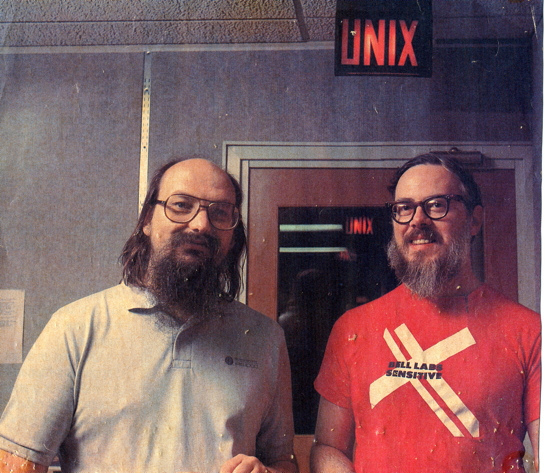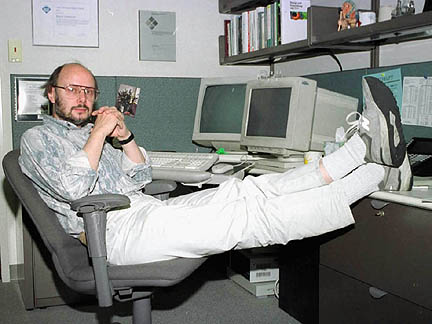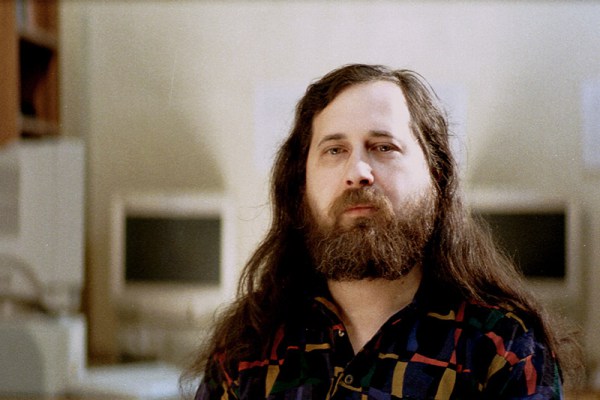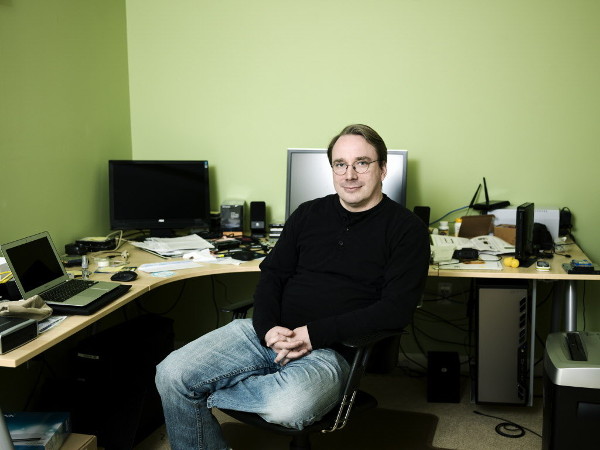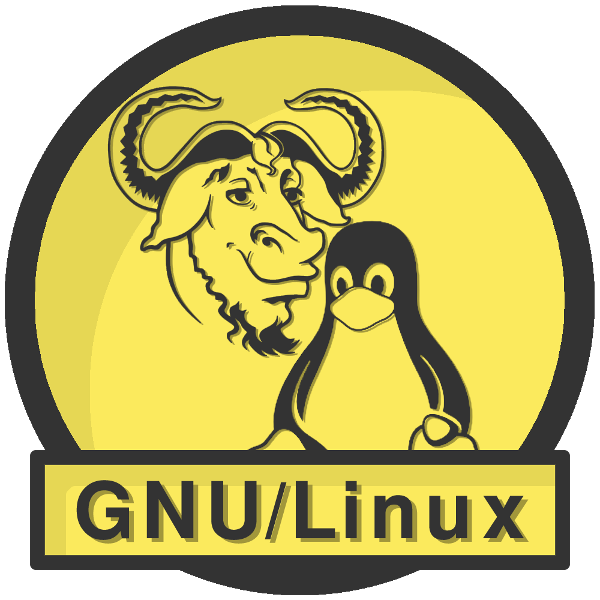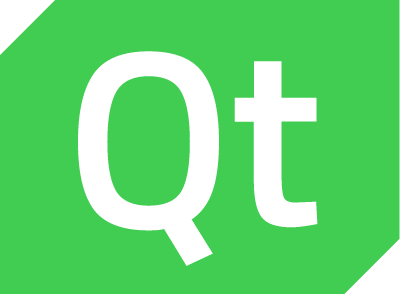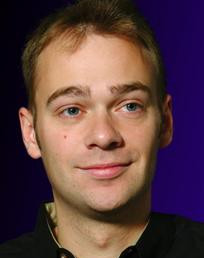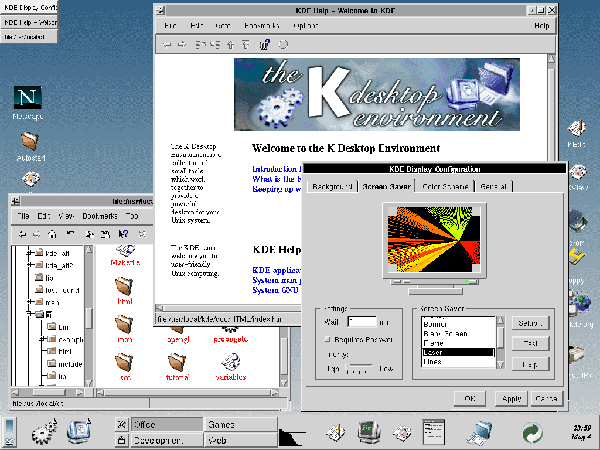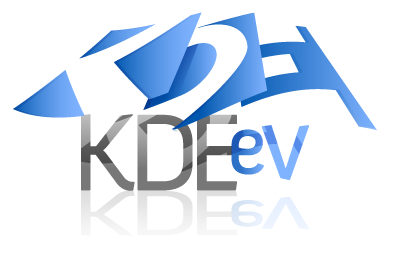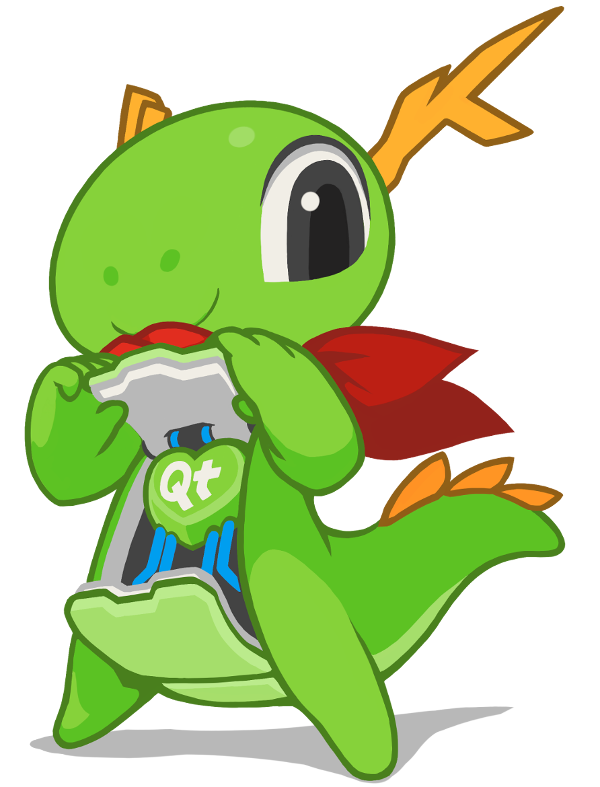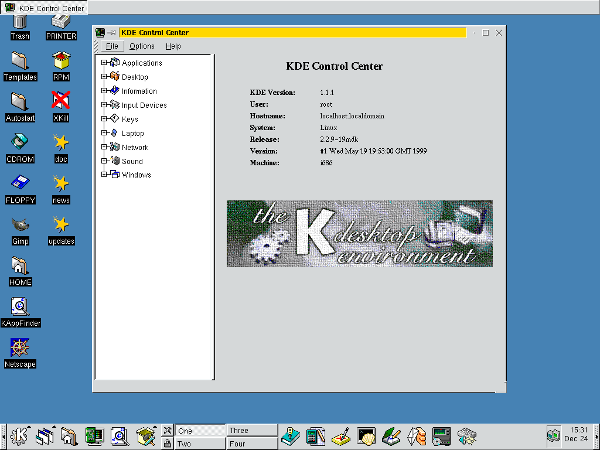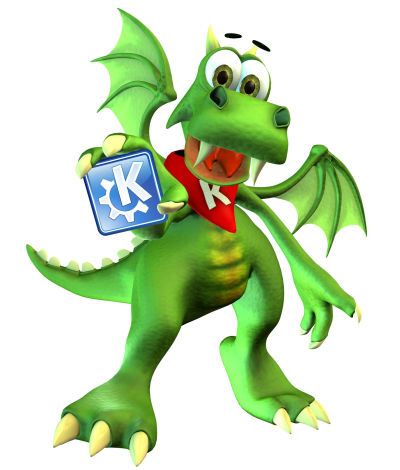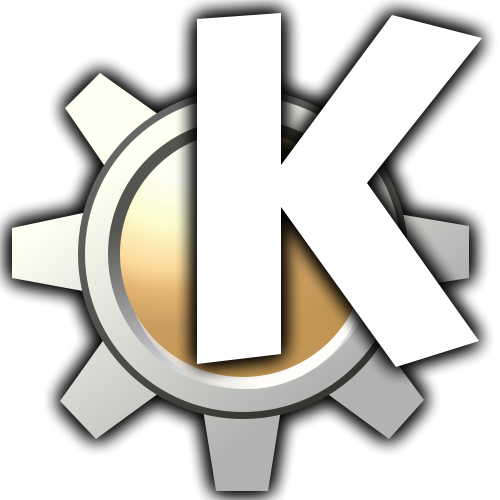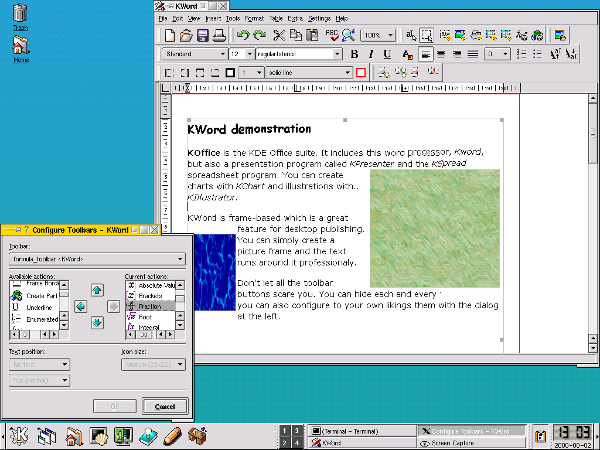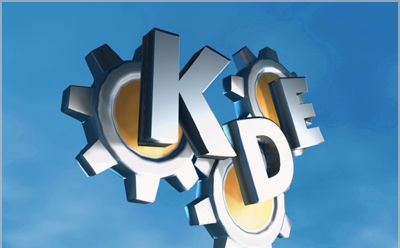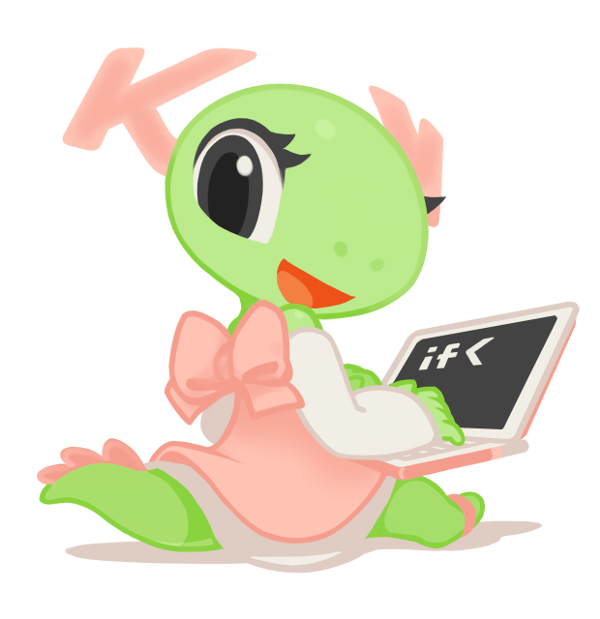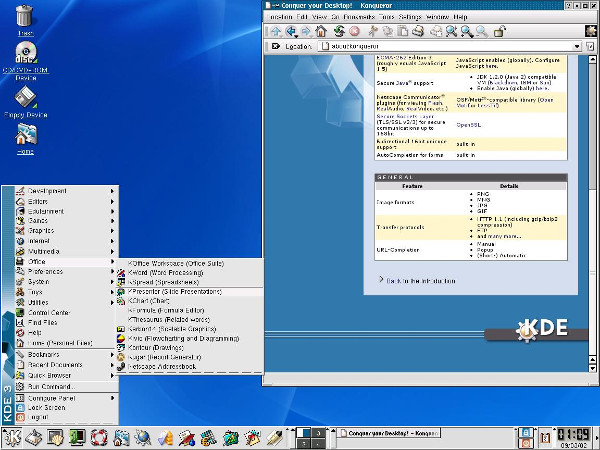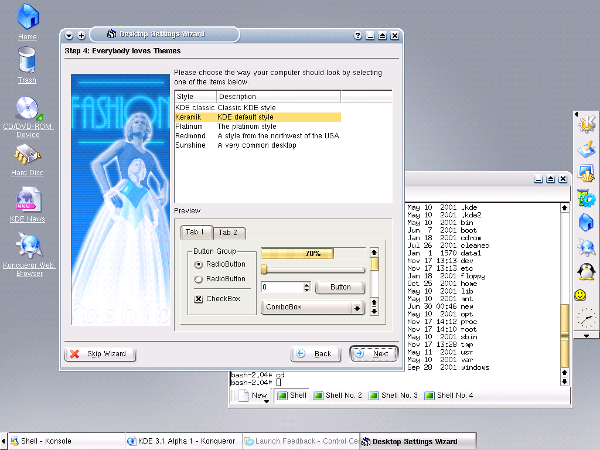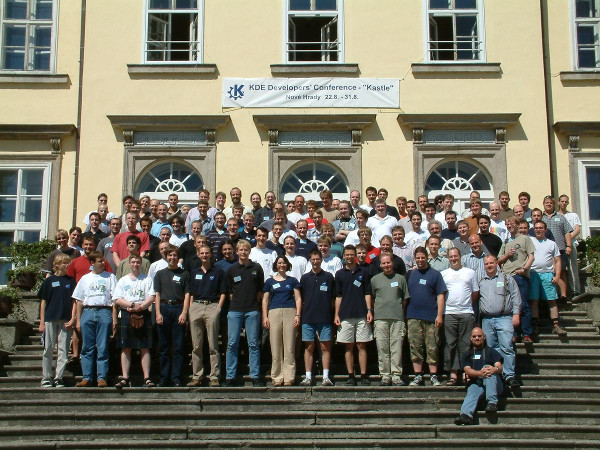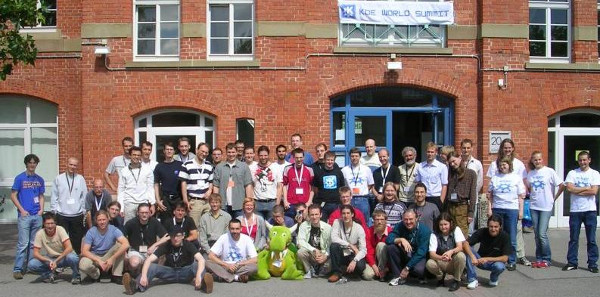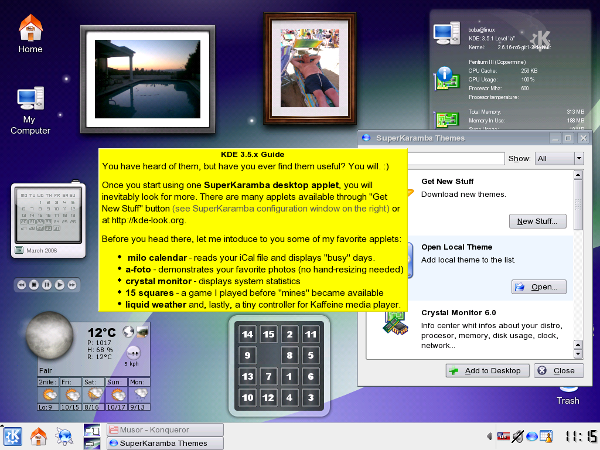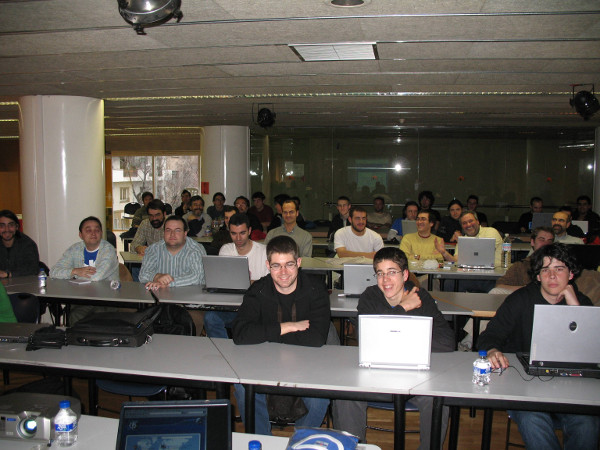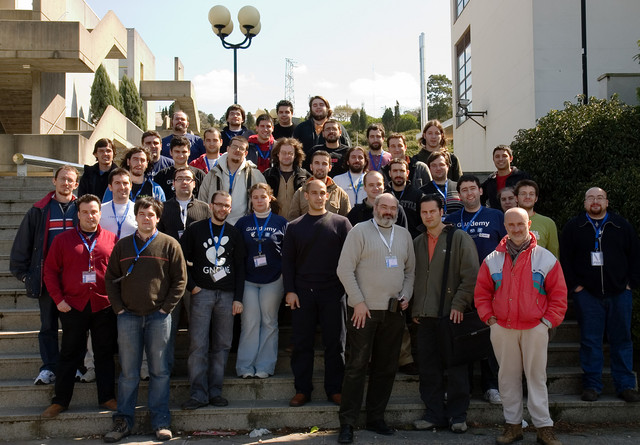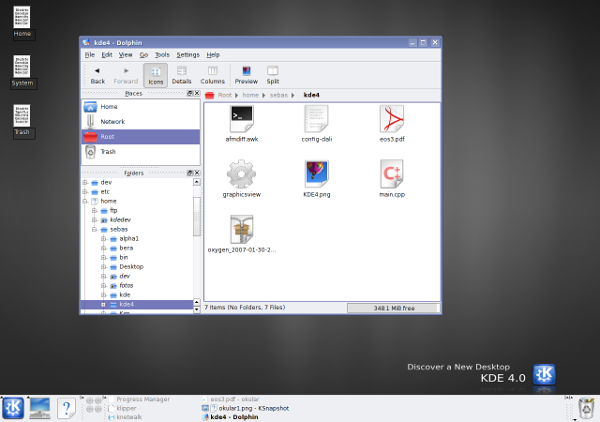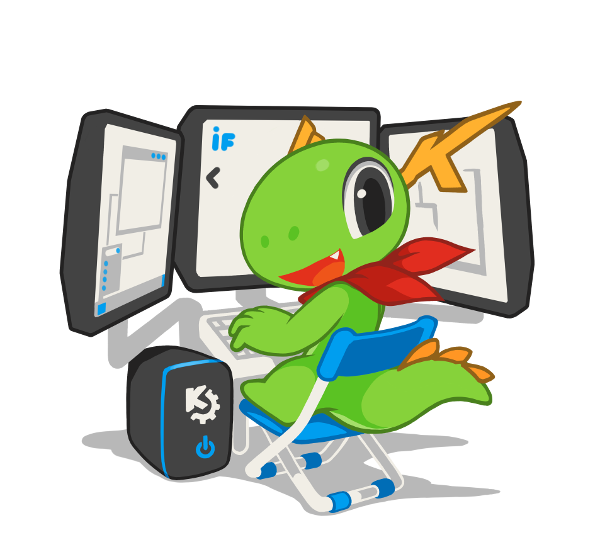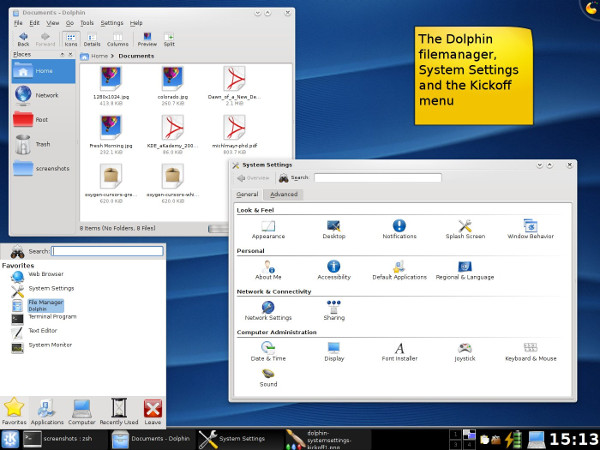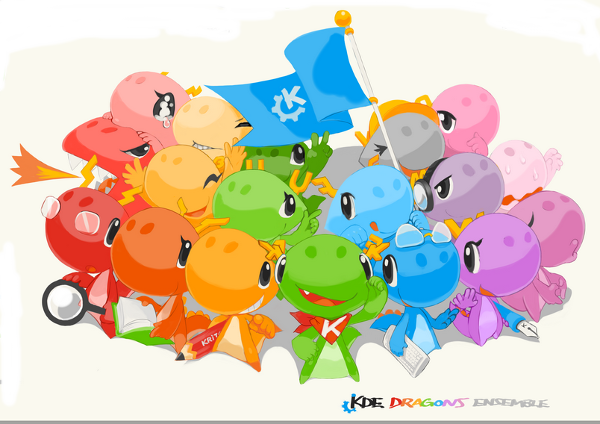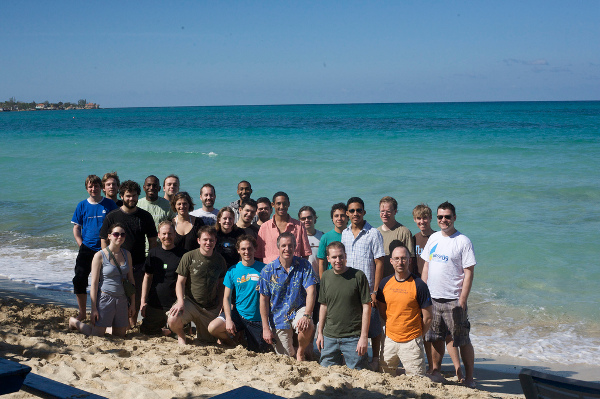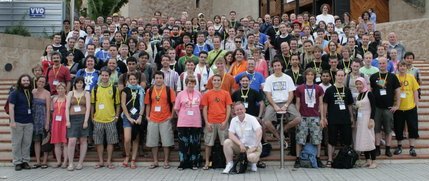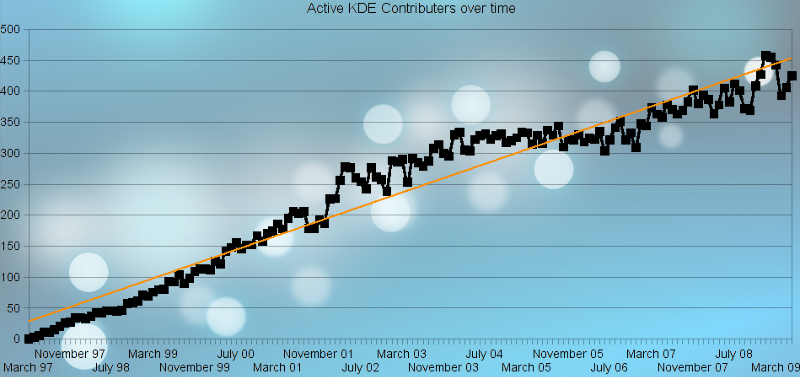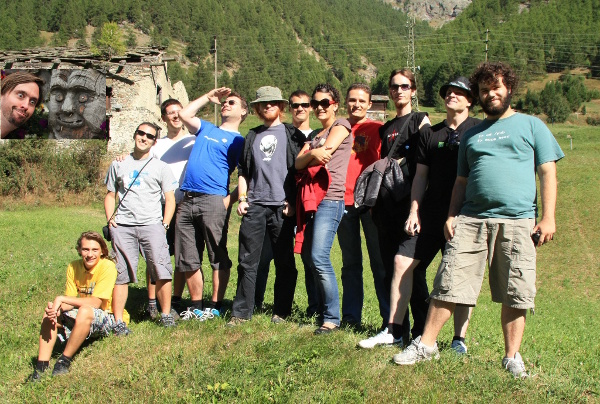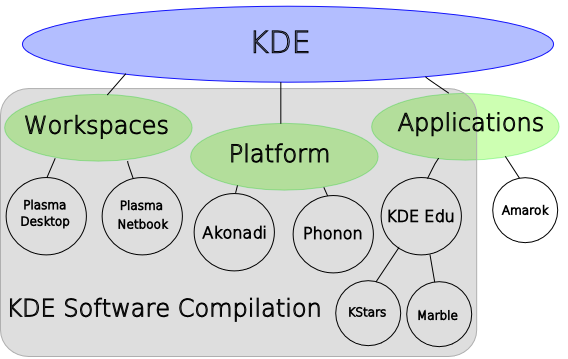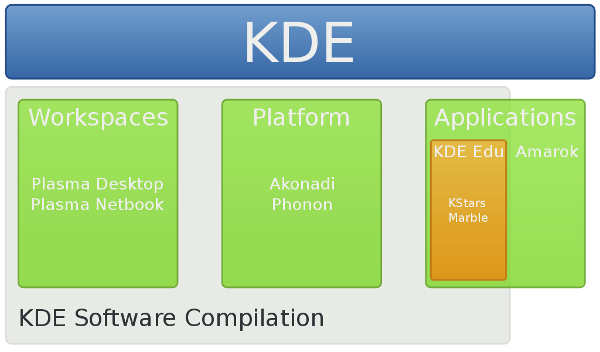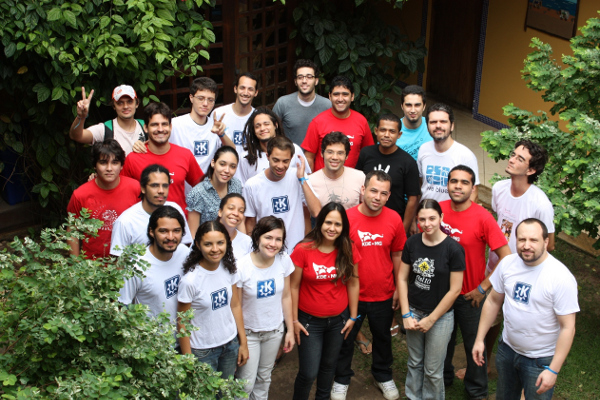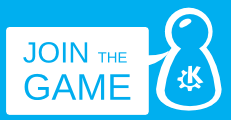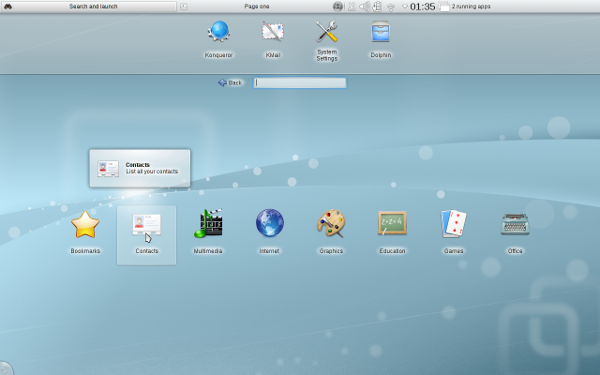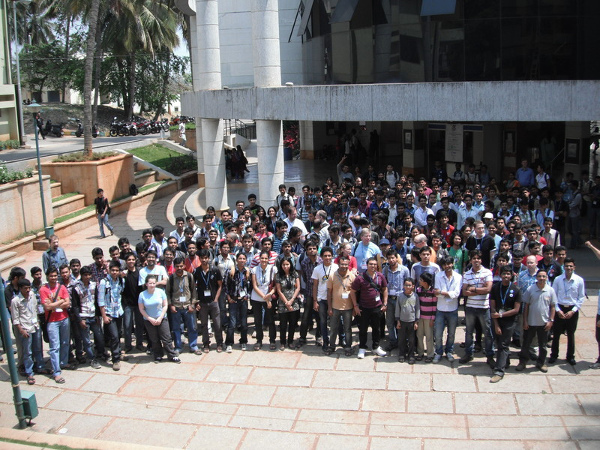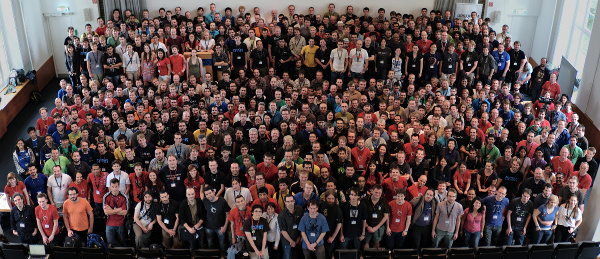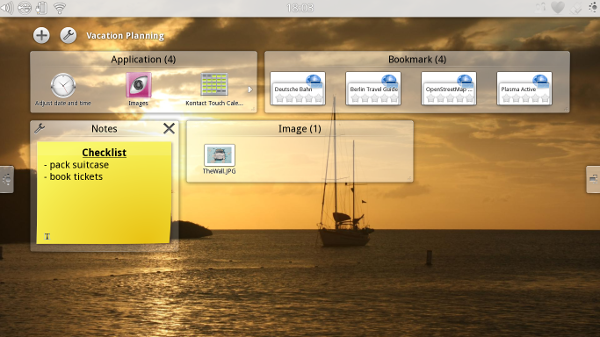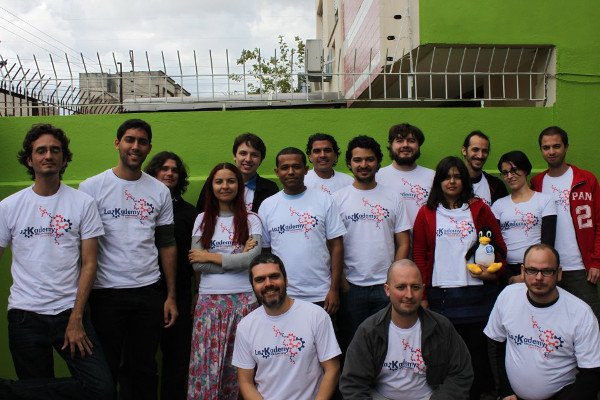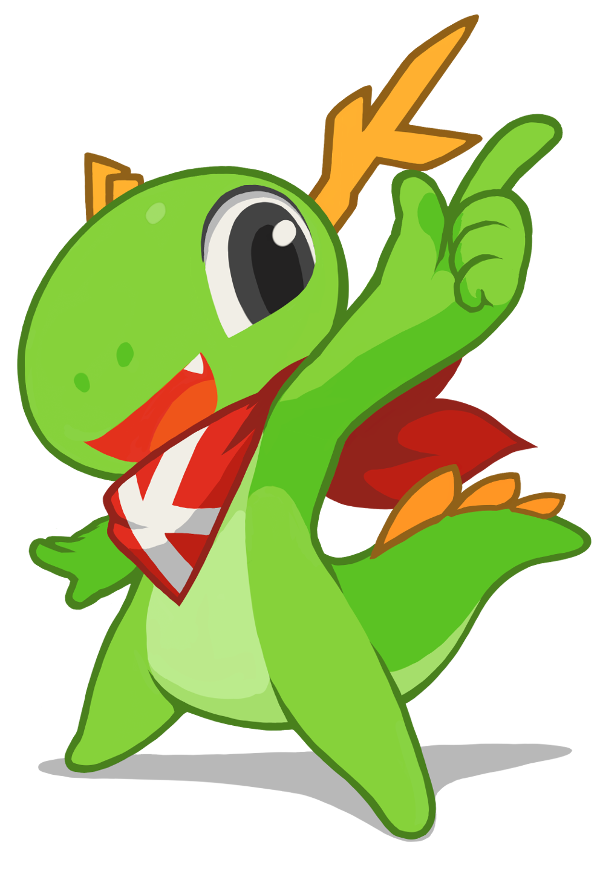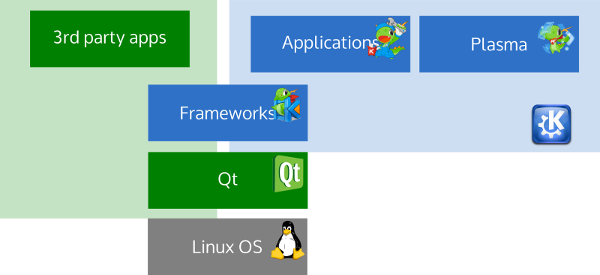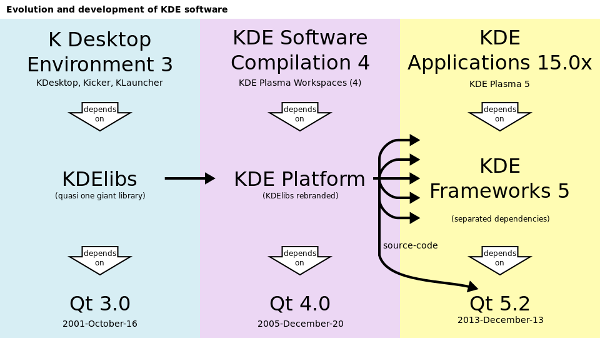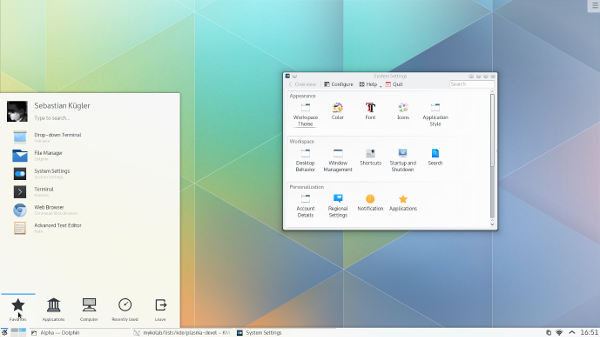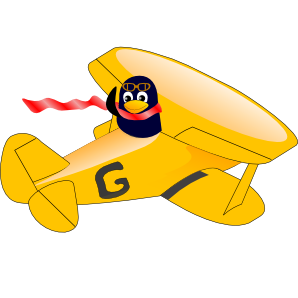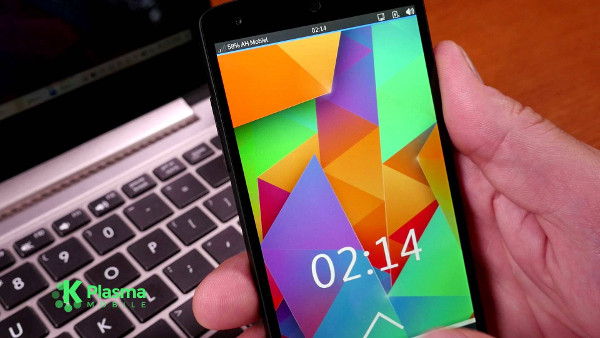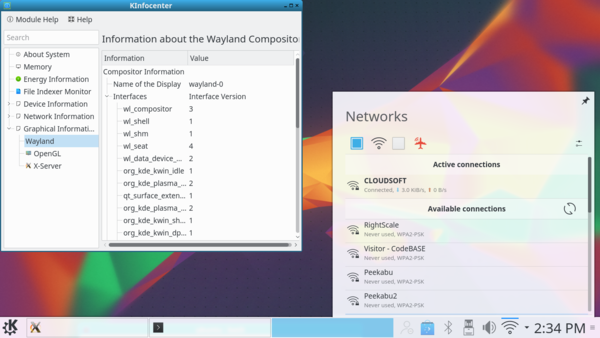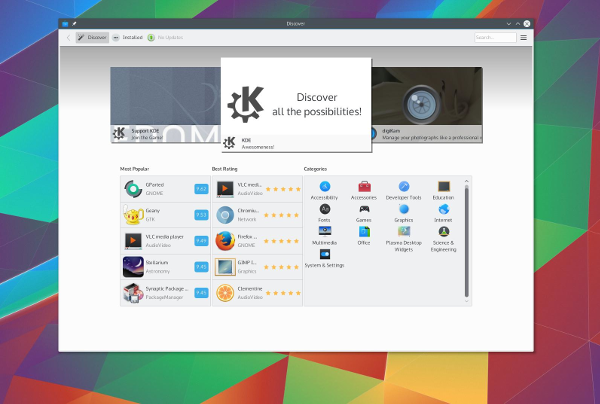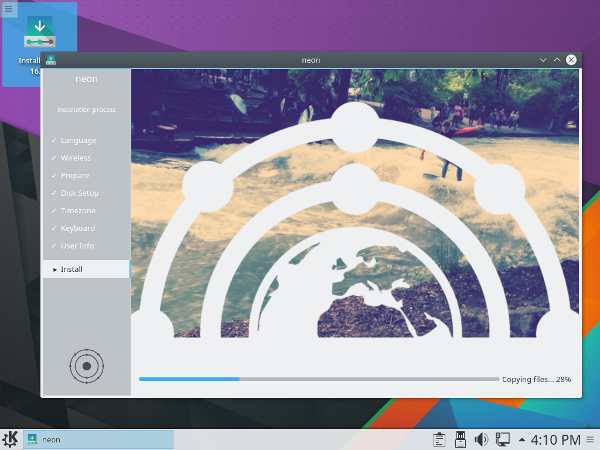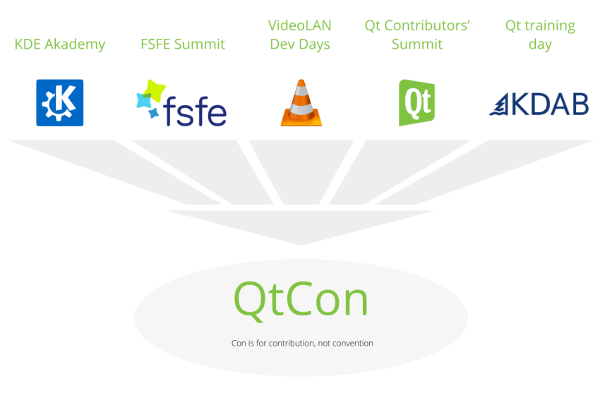UNIX syntyy
Vuonna 1969 Ken Thompson ja Dennis Ritchie aloittivat työn UNIXin parissa. Alkuun sitä koodattiin assemblerilla, mutta jo pian uudelleen C:llä, Ritchien luomalla korkeamman tason kielellä.
C++ kehitettiin
Vuonna 1979 Bjarne Stroustrup alkoi kehittää ”C:tä, jossa on luokat”, josta myöhemmin muodostui C++. Se oli hänen mukaansa ajan ainoa kieli, jolla saattoi kirjoittaa yhtä aikaa tehokasta ja eleganttia ohjelmakoodia.
Vapaan ohjelmiston alku
Vuonna 1984 Richard Stallman alkoi kehittää GNU’ta (”GNU is Not Unix”), kaupalliseen Unixiin perustuvaa täysin vapaata käyttöjärjestelmää.
Linux-ydin
Vuonna 1991, Linus Torvalds loi Linux-ytimen, joka perustui Andrew Tanenbaumin Unix-versioon MINIXiin. Linuxin synty vallankumouksellisti vapaiden ohjelmien historian ja auttoi tekemään siitä suosittua. Ks. Linux-ytimen kehityksen 25 vuotta -infografiikkaa.
Qt luodaan
Vuonna 1995 norjalainen Troll Tech -yhtiö loi monialustaisen kehitysalustan Qt:n, jolla seuraavana vuonna kirjoitettiin KDE. Qt:sta on kuluneina 20 vuonna tullut KDE-tekniikoiden pohja. Lisätietoa: Qt History.
KDE julkistetaan
Vuonna 1996 Matthias Ettrich julkisti Kool Desktop Environmentin (KDE), graafisen käyttöliittymän Unix-järjestelmille, joka perustui Qt:hen ja C++:aan ja oli kohdistettu loppukäyttäjälle. ”KDE”-nimi viittasi leikillisesti CDE-ympäristöön, joka tuolloin oli kaupallinen. Lue KDE-projektin alkuperäinen julkistustiedote.
KDE One -konferenssi
Vuonna 1997 noin 15 KDE-kehittäjää tapasi Arnsbergissa Saksassa työstääkseen projektia ja keskustellakseen sen tulevaisuudesta. Tapahtuma tunnetaan nimellä KDE One.
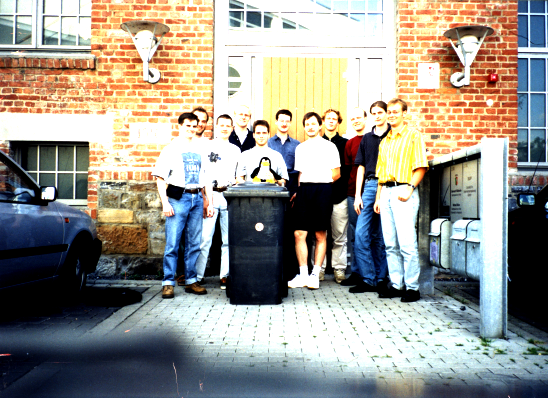 Cornelius Schumacherin arkisto
Cornelius Schumacherin arkistoKDE beeta 1
KDE:n ensimmäinen beetaversio julkaistiin tasan 12 kuukautta projektin julkistamisesta. Julkaisutiedote korosti, ettei KDE ole ikkunanhallintaohjelma vaan kokonainen työpöytäympäristö, josta ikkunanhallinta on vain osa.
KDE e.V. perustetaan
Vuonna 1997 perustettiin Tübingenissä Saksassa KDE e.V., voittoa tavoittelematon järjestö, edustamaan taloudellisesti ja laillisesti KDE-yhteisöä.
KDE Free Qt Foundation perustetaan
The foundation agreement for the KDE Free Qt Foundation is signed by KDE e.V. and Trolltech, then owner of Qt. The Foundation ensures the permanent availability of Qt as Free Software.
KDE 1 julkaistaan
KDE julkaisi graafisen ympäristönsä ensimmäisen vakaan version 1998, ja painotti tuolloin sovelluskehityskehystä, KOM/OpenPartsia, sekä toimisto-ohjelmiston ennakkoversiota.
Konqi
Huhtikuussa 1999 paljastettiin KDE:n ohjekeskuksen uudeksi animoiduksi avustajaksi lohikäärme. Se oli niin valloittava, että korvasi aiemman projektimaskotin Kandalfin versiosta 3.x alkaen. Katso KDE 2 -kuvakaappausta, jossa näkyvät Konqi ja Kandalf.
KDE Two -konferenssi
In October 1999, the second meeting of KDE developers took place in Erlangen, Germany. Read the report on the KDE Two Conference.
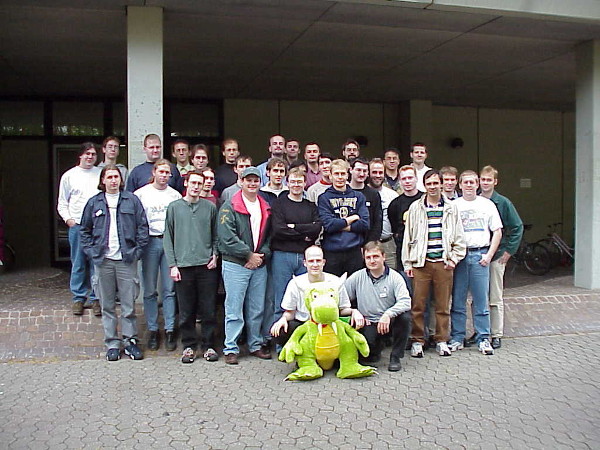 Ryhmävalokuva (Cornelius Schumacherin arkisto)
Ryhmävalokuva (Cornelius Schumacherin arkisto)KDE-työpöytä
From the beta 1 version of KDE 2 it is possible to perceive a project naming change. The releases that once referred to the project as "K Desktop Environment", began referring to it only as "KDE Desktop".
KDE Three Beta -konferenssi
In July 2000, the third meeting (beta) of KDE developers occurred in Trysil, Norway. Find out what was done during the conference.
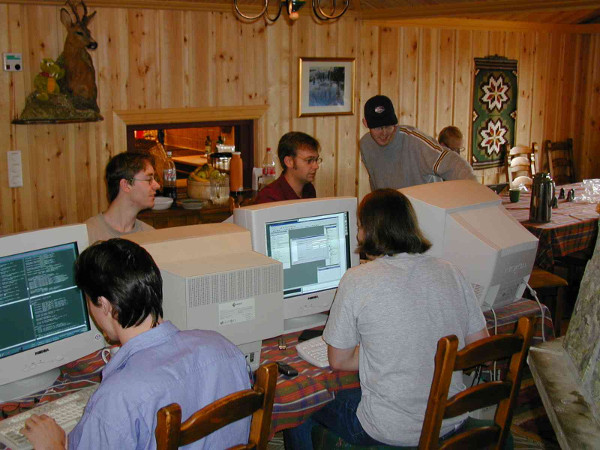 Cornelius Schumacherin arkisto
Cornelius Schumacherin arkistoKDE-projekti
Version 2.1.2 julkaisutiedotteessa nimitykset muuttuvat. KDE:hen aletaan viitata ”KDE-projektina”.
KDE Women
Maaliskuussa 2001 julkistettiin yhteisön naisryhmän perustaminen. KDE Women tähtää naisten osuuden lisäämiseen vapaan ohjelmiston yhteisöissä, etenkin KDE:ssä. Katso Akademyn video ”Highlights of KDE Women” vuodelta 2010.
KDE Three -tapaaminen
Maaliskuussa 2002 noin 25 kehittäjää kokoontui kolmanteen KDE-tapaamiseensa Nürnbergissä Saksassa. KDE 3 oltiin pian julkaisemassa, ja KDE 2:n koodi piti siirtää käyttämään uusia Qt 3 -kirjastoja.
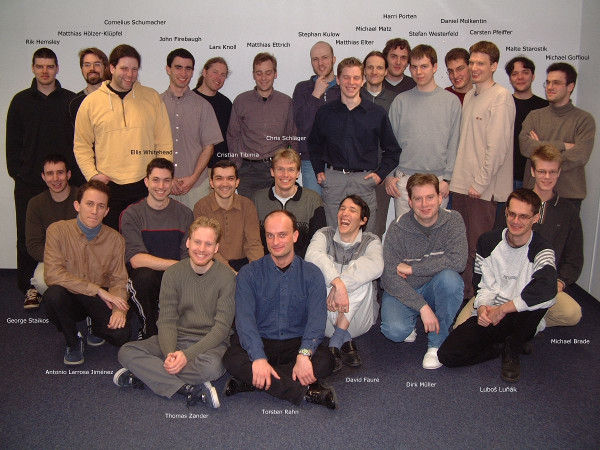 Ryhmävalokuva KDE Threestä
Ryhmävalokuva KDE ThreestäKDE 3
KDE julkaisi kolmannen versionsa, jonka tärkeitä uutuuksia olivat uusi tulostuskehys, KDEPrint, projektin käännös 50 kielelle sekä KDE Edutainment -projektin ylläpitämä opetussovelluspaketti.
KDE e.V:n tapaaminen
In August 2002, there was a meeting of board members of the KDE e.V. that was essential to establish how the organization works. At this meeting it was decided, among other things, that the brand "KDE" would be registered and that new members should be invited and supported by two active members of e.V..
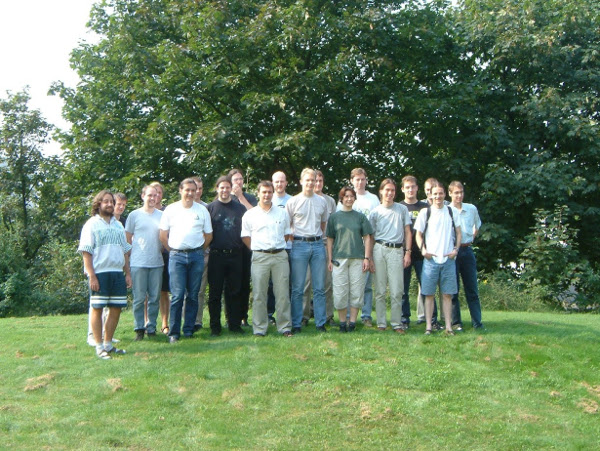 Ryhmävalokuva (Cornelius Schumacherin arkisto)
Ryhmävalokuva (Cornelius Schumacherin arkisto)KDE 3.1
In version 3.1 the community presented KDE with a new look, a new theme for widgets, called Keramik, and Crystal as default theme for the icons. See KDE 3.1 New Feature Guide.
Kastle
In August 2003, about 100 contributors of KDE from various countries gathered in a castle in the Czech Republic. The event was called Kastle and was the forerunner of Akademy, the event that would become the international annual meeting of the community.
Akademy 2004
In August 2004, the first international meeting of the community took place. The event was held in Ludwigsburg, Germany, and launched a series of international events called "Akademy" which take place annually since then. The event got its name because it happened in the "Filmakademie" city film school. See the group photos of all Akademies.
KDE 3.5
KDE 3.5 was released. This version introduced several new features, among them, the SuperKaramba, a tool that allowed customize your desktop with "applets"; the Amarok and Kaffeine players; and the media burner K3B. See KDE 3.5: A Visual Guide to New Features.
Ensimmäinen Akademy-Es
In March 2006, the first meeting of Spanish KDE contributors took place in Barcelona. Since then, Akademy-Es has turned into an annual event. Learn more about Spanish KDE contributors group.
KDE Four Core -tapaaminen
In July 2006, the developers of the KDE core libraries gathered in Trysill, Norway, for the KDE Four Core meeting. The event was a kind of successor to the KDE Beta Three Conference and KDE Three Meeting and in it developers worked on the development of KDE 4 and stabilization of some core libraries to the project.
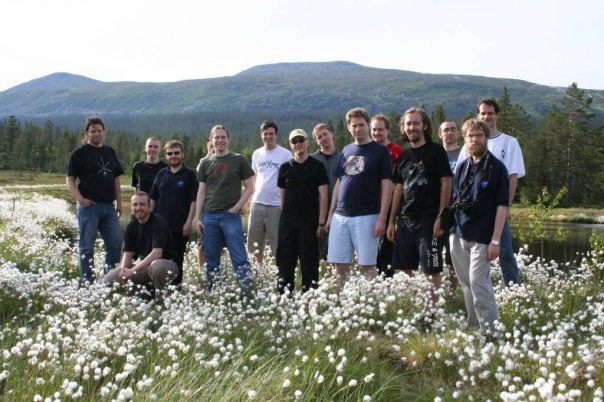 Ryhmävalokuva (Cornelius Schumacherin arkisto)
Ryhmävalokuva (Cornelius Schumacherin arkisto)Guademy
KDE 4 alfa 1
Toukokuussa 2007 julkaistiin KDE 4:n versio alfa 1, koodinimeltään ”Knut”. Julkaisu esitteli täysin uuden työpöydän, uuden teeman, Oxygenin, uusia sovelluksia kuten Okularin ja Dolphinin sekä uuden työpöydän, Plasman. Ks. KDE 4.0 alfa 1: Visuaalinen opas uusiin ominaisuuksiin.
KDE 4 -kehitysalusta
Lokakuussa 2007 KDE julkaisi kehitysalustansa julkaisuehdokkaan, joka koostui KDE-sovellusten kehittämisen peruskirjastoista ja -työkaluista.
KDE 4
Vuonna 2008 yhteisö julkisti vallankumouksellisen KDE 4:n. Uuden näyttävän Oxygen-oletusteeman ja uuden Plasma-työpöytäkäyttöliittymän lisäksi KDE 4 uudistui esittelemällä seuraavat sovellukset: Okular-PDF-lukijan, Dolphin-tiedostonhallinnan sekä näyttötehosteita tukevan KWin-ikkunanhallinnan. Ks. Visuaalinen opas KDE 4.0:aan.
KDE-yhteisö
From the announcement of version 4.1 on there was already a tendency to refer to KDE as a "community" and not just as a "project". This change was recognized and affirmed in the rebranding announcement of the following year.
Ensimmäinen Camp KDE
In January 2009, the first edition of Camp KDE took place in Negril, Jamaica. It was the first KDE event in the Americas. After that, there were two more US-based conferences, in 2010 in San Diego, and another in 2011 in San Francisco.
Desktop Summit Gran Canarialla
In July 2009, the first Desktop Summit, a joint conference of the KDE and Gnome communities, took place in Gran Canaria, Spain. The Akademy 2009 was held with this event.
Miljoona toimitusta
The community reached the mark of 1 million of commits. From 500,000 in January 2006 and 750,000 in December 2007, only 19 months later, contributions reached the 1 million mark. The increase in these contributions coincides with the launch of innovative KDE 4.
Ensimmäiset Randa-tapaamiset
In September 2009, the first of a series of events known as Randa Meetings took place in Randa, in Swiss Alps. The event brought together several sprints of various community projects. Since then, Randa Meetings take place annually.
Rebranding
In November 2009, the community announced changes to its brand. The name "K Desktop Environment" had become ambiguous and obsolete and is replaced by "KDE". The name "KDE" is no longer just referring to a desktop environment, but now represents both the community and the project umbrella supported by this community.
KDE Software Compilation
From version 4.3.4 on, KDE announcements began to refer to the whole suite of products as 'KDE Software Compilation' (KDE SC). Currently, this trend is abandoned.
Akademy-Br
In April 2010, the first meeting of Brazil KDE contributors took place. The event was held in Salvador, Bahia, and was the only Brazilian Akademy edition. From 2012 on, the event expanded to a meeting for all Latin American contributors.
Join the Game
In June 2010, the KDE e.V. announced the supporting membership program "Join the Game", which aims to encourage financial support to the community. By participating in the program you become a member of the KDE e.V., contributing to an annual amount and being able participate in the organization's annual meetings.
KDE SC 4.5
In August 2010, the community announced version 4.5 of its products: Development Platform, Applications and Plasma Workspaces. Each of them began to have a separate release announcement. One of the highlights of this version was the Plasma interface for netbooks, announced in version 4.4.
Calligra Suite
In December 2010, the community announces the Calligra Suite, a split from the KOffice suite. KOffice was discontinued in 2011.
Ensimmäinen Conf India
In March 2011, the first conference of the KDE and Qt community in India took place in Bengaluru. Since then, the event has taken place annually.
Desktop Summit 2011
In August 2011, another joint conference of the KDE and Gnome communities took place in Berlin, Germany. Nearly 800 contributors from all over the world came together to share ideas and collaborate on various free software projects.
Plasma Active
The community released the first version of its interface for mobile devices, Plasma Active. Later, it was superseded by Plasma Mobile.
Ensimmäinen LaKademy
In April 2012, the first meeting of the KDE contributors in Latin America, LaKademy, took place. The event was held in Porto Alegre, Brazil. The second edition took place in 2014 in São Paulo, and since then has been an annual event. So far, all editions were held in Brazil, where the highest number of contributors from the Latin American community is based.
KDE:n manifesti
KDE Manifesto, a document that presents the benefits and obligations of a KDE project, was released. It also introduces the core values that guide the community: Open Governance, Free Software, Inclusivity, Innovation, Common Ownership, and End-User Focus.
Uusi Konqi
In December 2012, the community launched a competition to create a new mascot using Krita. The competition winner was Tyson Tan, who created new looks for the Konqi and Katie.
Julkaisusyklin muutos
In September 2013, the community announced changes in the release cycle of its products. Each of them, Workspaces, Applications, and Platform, now have separate releases. The change was already a reflection of the restructuring of KDE technologies. This restructuring resulted in the next generation of community products, which would be released the following year.
Frameworks 5
Frameworks 5:n (KF5), KDE Platform 4:n jatkajan, ensimmäinen vakaa versio julkaistiin. Tämä uusi Qt 5:een perustuva KDE-kirjastojen sukupolvi on tehnyt KDE-kehityksestä modulaarisempaa ja mahdollistanut monialustaisen kehitystyön.
Plasma 5
Release of the first stable version of Plasma 5. This new generation of Plasma has a new theme, Breeze. Changes include a migration to a new, fully hardware-accelerated graphics stack centered around an OpenGL(ES) scenegraph. This version of Plasma uses as base the Qt 5 and Frameworks 5.
GCompris liittyy KDE:hen
Joulukuussa 2014 opetussovellusohjelmisto GCompris liittyi KDE-yhteisön projektihautomoon. Projektin vuonna 2000 luonut Bruno Coudoin päätti kirjoittaa ohjelman uudelleen Qt Quickillä mahdollistaakseen sen käytön mobiilialustoilla. Alkuaan se oli kirjoitettu Gtk+:lla.
Plasma Mobile
Yhteisö julkisti Plasma Mobilen, Qt-, Frameworks 5- ja Plasma Shell -tekniikoita käyttävän älypuhelinliittymän.
Plasma Waylandissä
The first live image of Plasma running on Wayland was made available for download. Since 2011, the community works in support of Wayland by KWin, the Compositor of Plasma, and the Window Manager.
Plasma 5.5
Version 5.5 is announced with several new features: new icons added to the Breeze theme, support for OpenGL ES in KWin, progress to support Wayland, a new default font (Noto), a new design.
KDE Neon
QtConin Akademy 2016 -osa
Akademy 2016 took place as a part of QtCon in September 2016 in Berlin, Germany. The event brought together the Qt, FSFE, VideoLAN and KDE communities. It celebrated 20 years of KDE, 20 years of VLC, and 15 years of FSFE.
Kirigami-käyttöliittymä
Kirigami is released, a set of QML components to develop applications based on Qt for mobile or desktop devices.
KDE julkistaa tulevaisuudenvisionsa
In early 2016, as a result of a survey and open discussions among community members, KDE has published a document outlining its vision for the future. This vision represents the values that its members consider most important: "A world in which everyone has control over their digital life and enjoys freedom and privacy." The idea in defining this vision was to make clear what are the main motivations that drive the community.
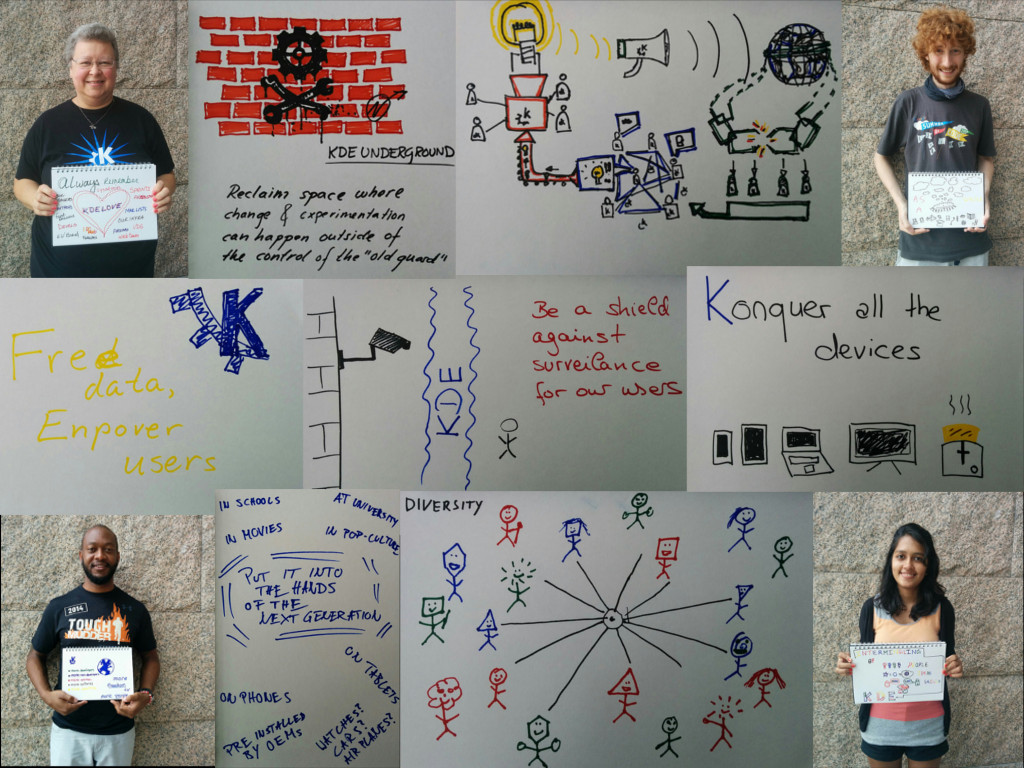
KDE announced the Advisory Board
In order to formalize the cooperation among the community and the organizations that have been its allies, KDE e.V. announced the Advisory Board. Through the Advisory Board, organizations can provide feedback on community activities and decisions, to participate in regular meetings with KDE e.V., and to attend to Akademy and community sprints.
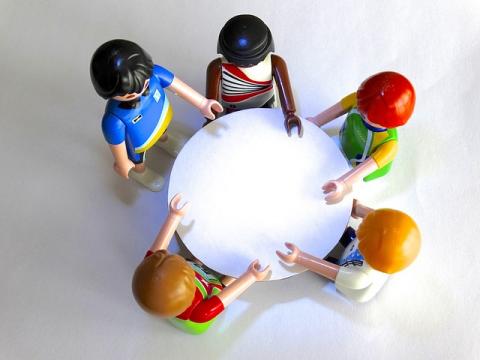
KDE juhlii 20 vuottaan
On October 14, KDE celebrated its 20th birthday. The project that started as a desktop environment for Unix systems, today is a community that incubates ideas and projects which go far beyond desktop technologies. To celebrate its anniversary the community published a book written by its contributors. We also had parties been held in eight countries.
 Elias Silveiran KDE 20 vuotta -taidetta
Elias Silveiran KDE 20 vuotta -taidettaKDE Slimbook julkistetaan
In partnership with a Spanish laptop retailer the community announced the launch of the KDE Slimbook, a ultrabook that comes with the KDE Plasma and KDE Applications pre-installed. The laptop offers a pre-installed version of KDE Neon and can be purchased from the retailer's website.
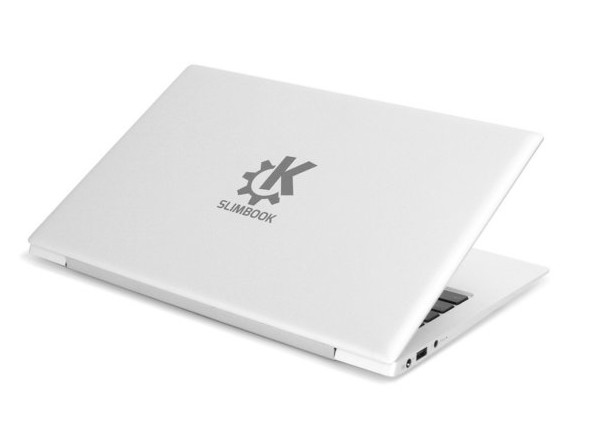 KDE Slimbook
KDE SlimbookQtCon Brasilia julkistettiin
Inspired by QtCon 2016, which took place in Berlin and brought together the KDE, VLC, Qt and FSFE communities, KDE community in Brazil hosted QtCon Brasil in 2017. The event was held in São Paulo and brought together Qt experts from Brazil and abroad in two days of talks and one day of training.
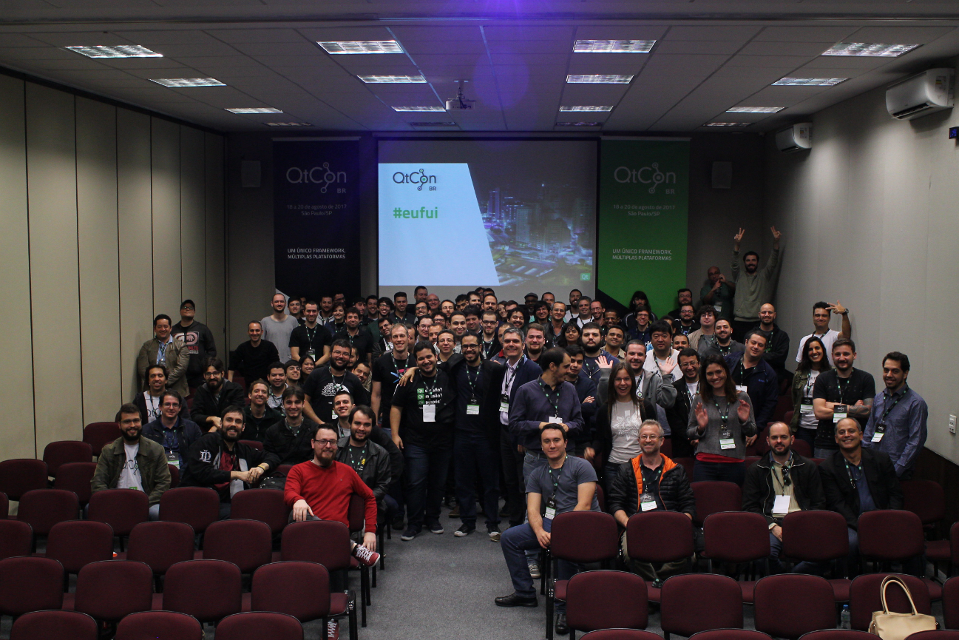
KDE asettaa tavoitteensa
KDE sets its goals for the next four years. As part of an effort undertaken by its members since 2015, the community has defined three main objectives for the coming years: to improve the usability and productivity of its software, to ensure that its software helps to preserve the privacy of users and to facilitate the contribution and integration of new collaborators.
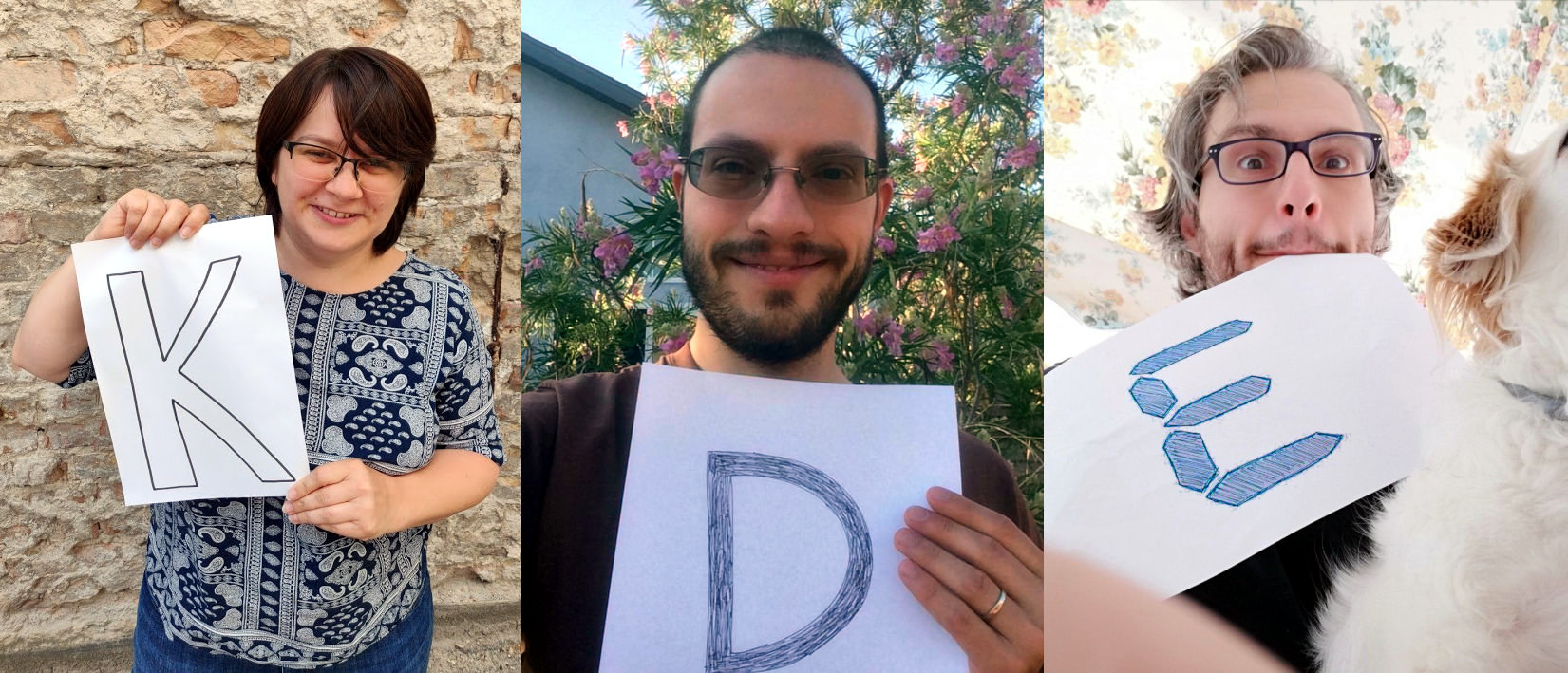
Handshake Foundation lahjoittaa KDE:lle 300 000 USD
Vuonna 2018 Handshake-säätiö lahjoitti KDE e.V:lle 300 000 USD. Summalla rahoitettiin projekteja, kehitettiin Calligra-toimisto-ohjelmistoa ja jatkettiin sitoumustamme vapaiden ja avoimen lähdekoodin ohjelmien luomiseksi käyttäjille kaikkialla maailmassa.
 Handshake Foundation
Handshake FoundationDebian liittyy KDE:n neuvottelukuntaan
Debian, maineikas vuonna 1993 aloitettu Linux-jakelu, liittyi KDE:n neuvottelukuntaan edistääkseen yhteisöjen välistä yhteistyötä. Tämän myötä odotamme kummankin yhteisön yhä vahvistuvan ja jatkavan yhdessä työtä FLOSS-projektien kehittämiseksi.
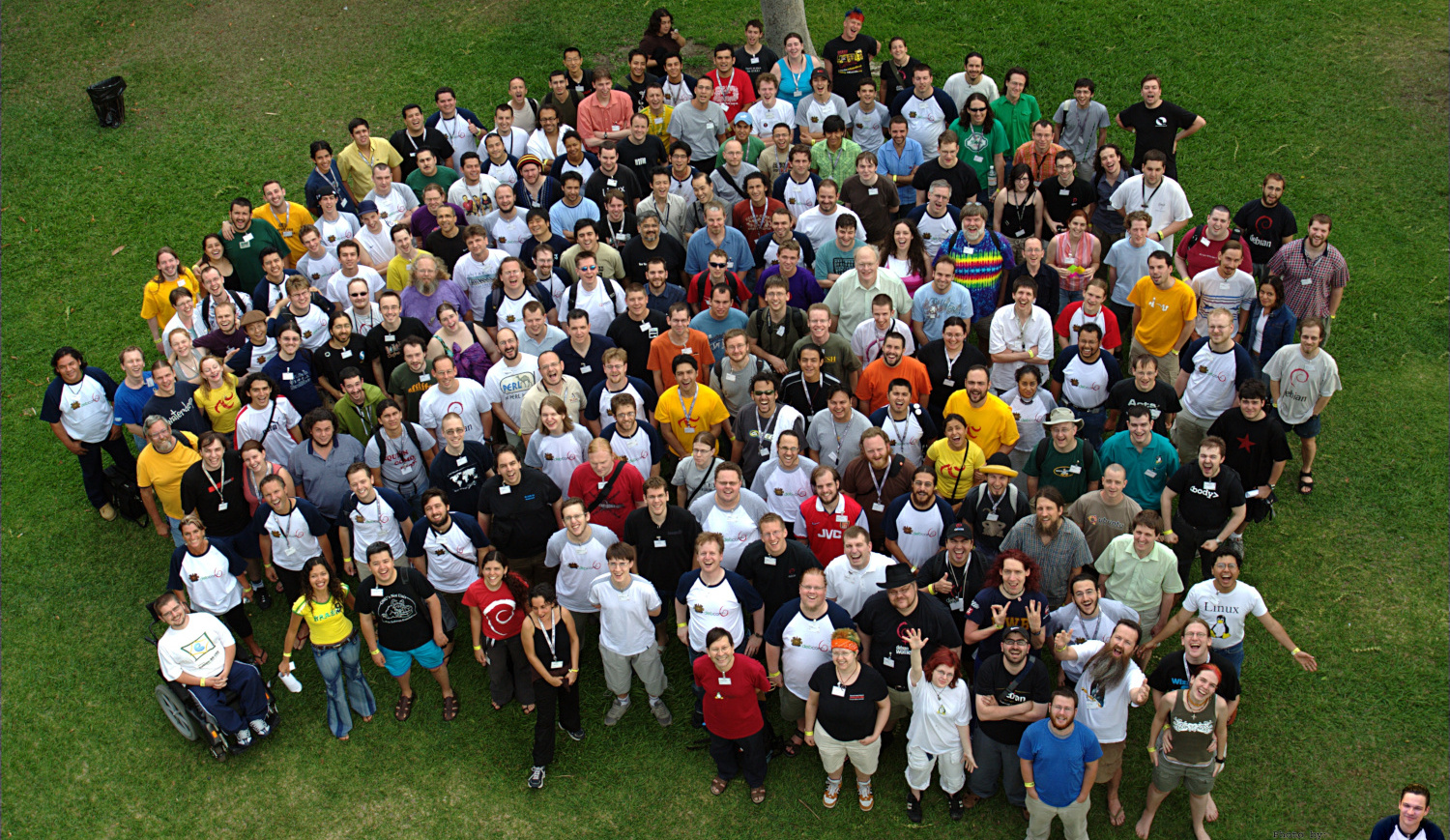 Debian-yhteisö
Debian-yhteisöPineApple Fund lahjoittaa KDE:lle 200 000 USD
Pineapple, an anonymous philanthropic fund, donated USD 200,000 to KDE e.V in 2018. This allowed KDE to keep paying for all the expenses related to our community, such as sprints and events.
 Pineapple Fund
Pineapple FundKDE-powered newspaper achieves world first
The Janayugom daily newspaper becomes the first in the world to switch to a completely free software stack for its publication. The regional paper has 100,000 subscribers across Kerala, India. An event celebrating the move is attended by the state's Chief Minister. Plasma, Okular, Krita, and more are deployed on systems across 14 different offices.

KDE vaihtaa verkkokehitysalustakseen GitLabin
In 2019, KDE transitioned to GitLab as our main DevOps platform. This change allowed the KDE community to work more efficiently and to lower the bar for new contributors to join us. Our GitLab instance can be found on KDE Invent.
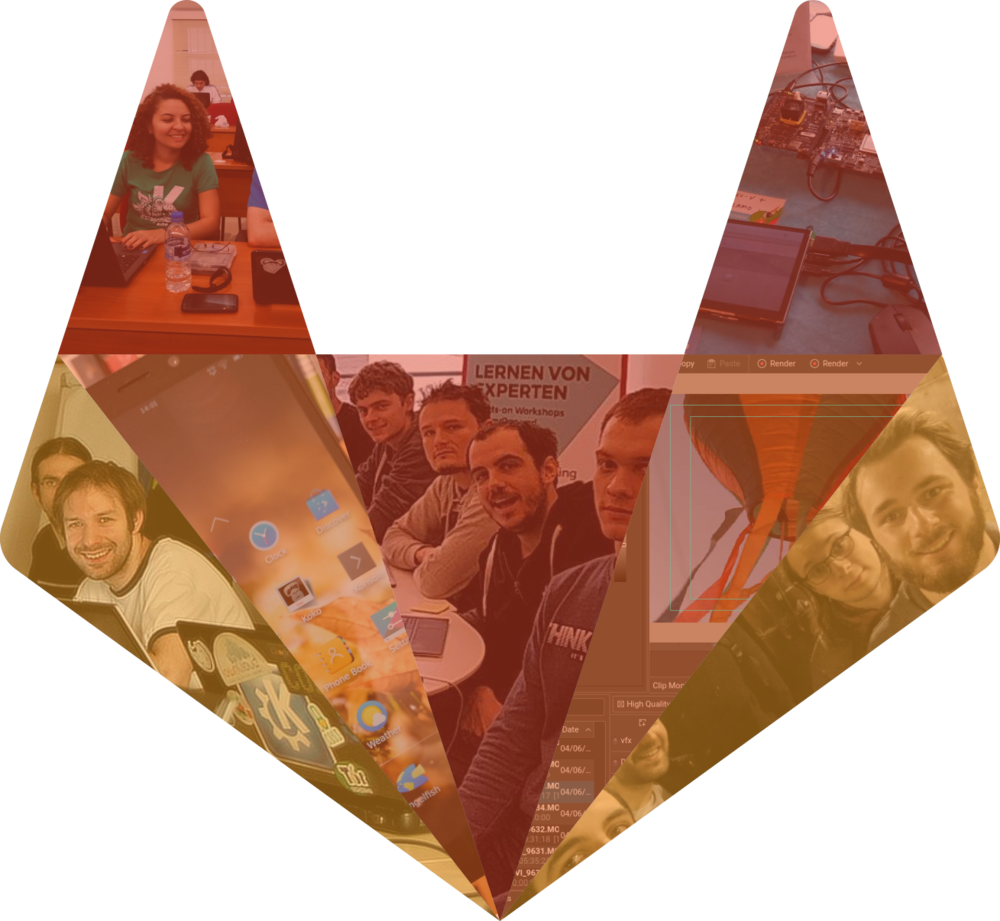 KDE vaihtaa GitLabiin
KDE vaihtaa GitLabiinUusia tavoitteita vuodelle 2019
KDE announces a new slate of goals for the near future at Akademy 2019. The community has whittled down a long list of proposals and chose to prioritize a consistent user experience across all KDE software, getting KDE apps into the hands of users with the help of new packaging methods, and improving the Wayland session.
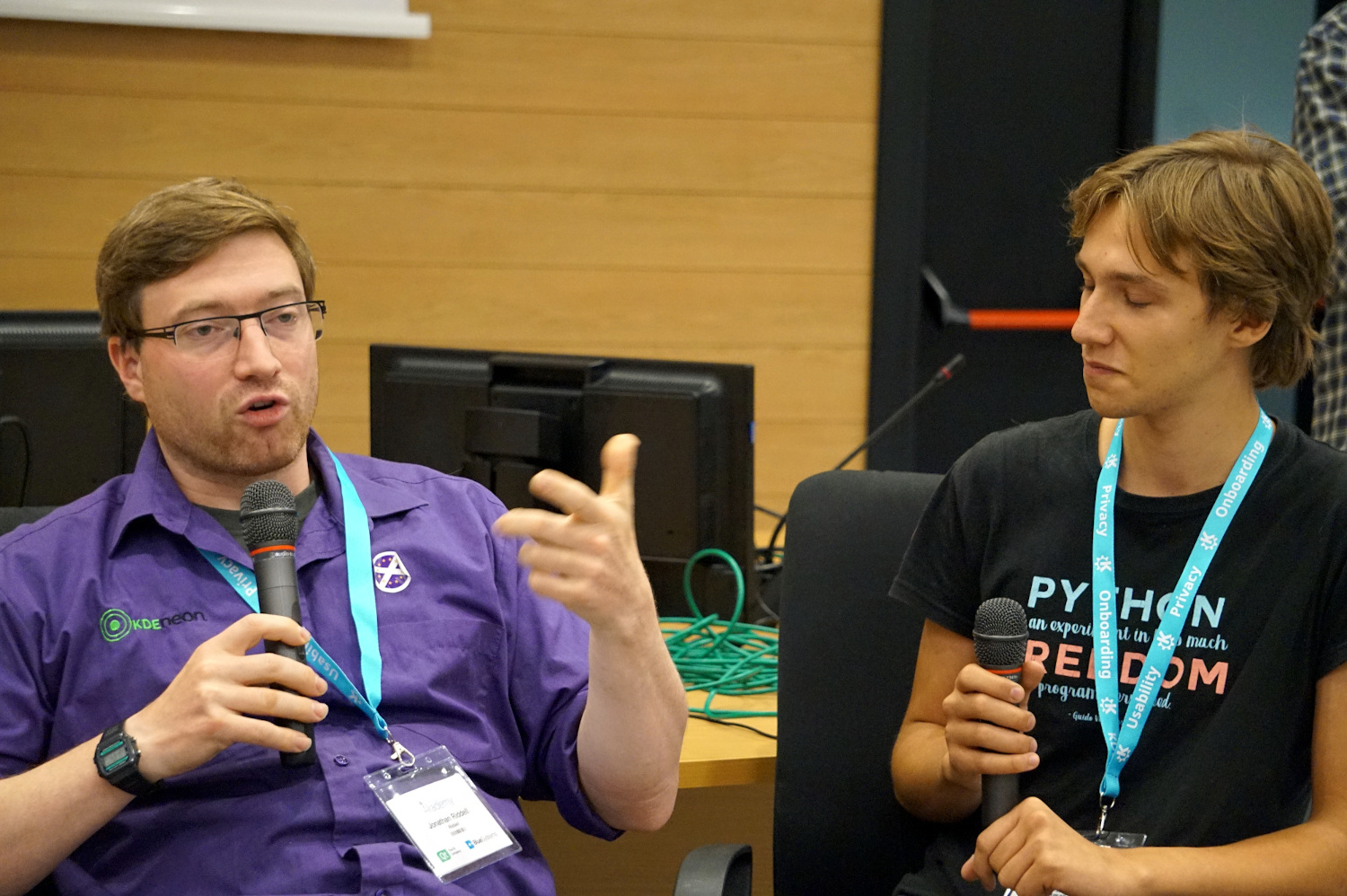
KDE omaksuu pikaviestialustakseen Matrixin
Matrix, an Open Source, decentralized and secure Instant Messaging platform, became the default and recommended way of communication for those who like their instant messaging graphical. Matrix allows community members to use a web-based, desktop or mobile clients, as well as native KDE clients, such as Neochat. IRC channels still exist and are bridged to Matrix, ensuring that members using different systems can communicate easily with each other. Likewise Telegram channels, although these are not considered official, as Telegram does not open source the code for its servers or encryption methods.
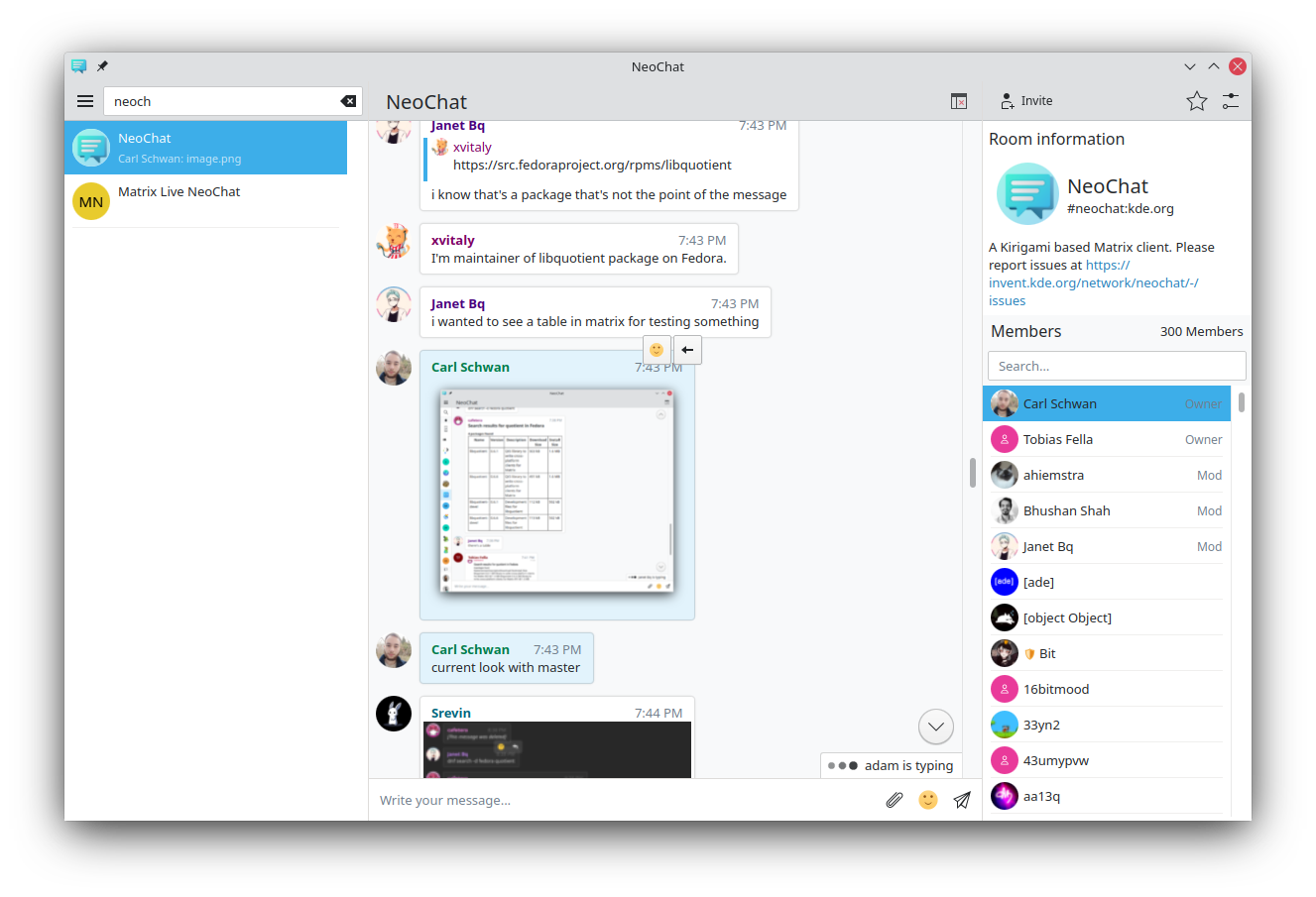
KDE PinePhone julkistetaan
KDE:n Plasma Mobile -kehittäjät liittyvät yhteistyöhön PINE64:n kanssa luodakseen PinePhone -KDE-yhteisöjulkaisun, pelkästään vapaita ohjelmia ajavan matkapuhelimen, jota on helppo mukauttaa ja joka varmistaa tietoturvasi.
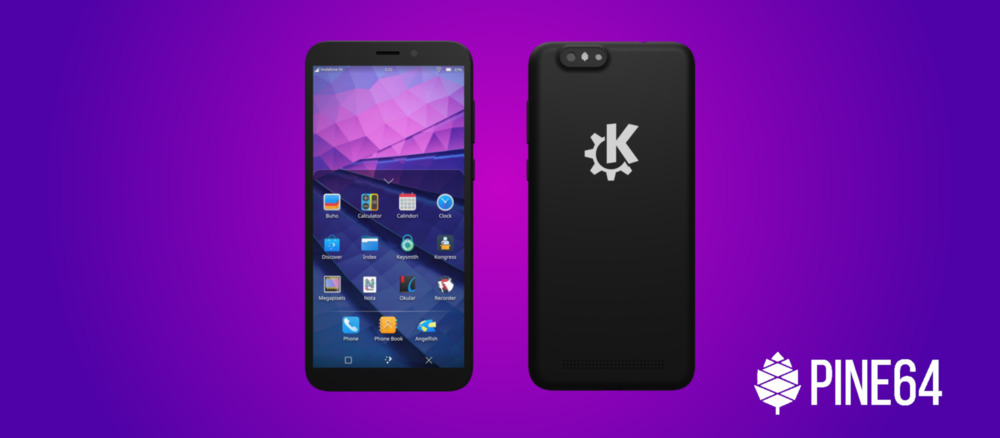 KDE PinePhone
KDE PinePhoneGCompris juhlii 20-vuotissyntymäpäiväänsä; Keralassa Intiassa sitä käyttävät tuhannet koulut.
Vuonna 2020 GCompris juhli 20-vuotissyntymäpäiväänsä pääsemällä käyttöön monissa Intian Keralan kouluissa. KDE:n opetussovellukset ovat auttaneet oppilaita ympäri maailmaa jo vuosikymmeniä ja ovat osa KDE:n opetusprojektia.
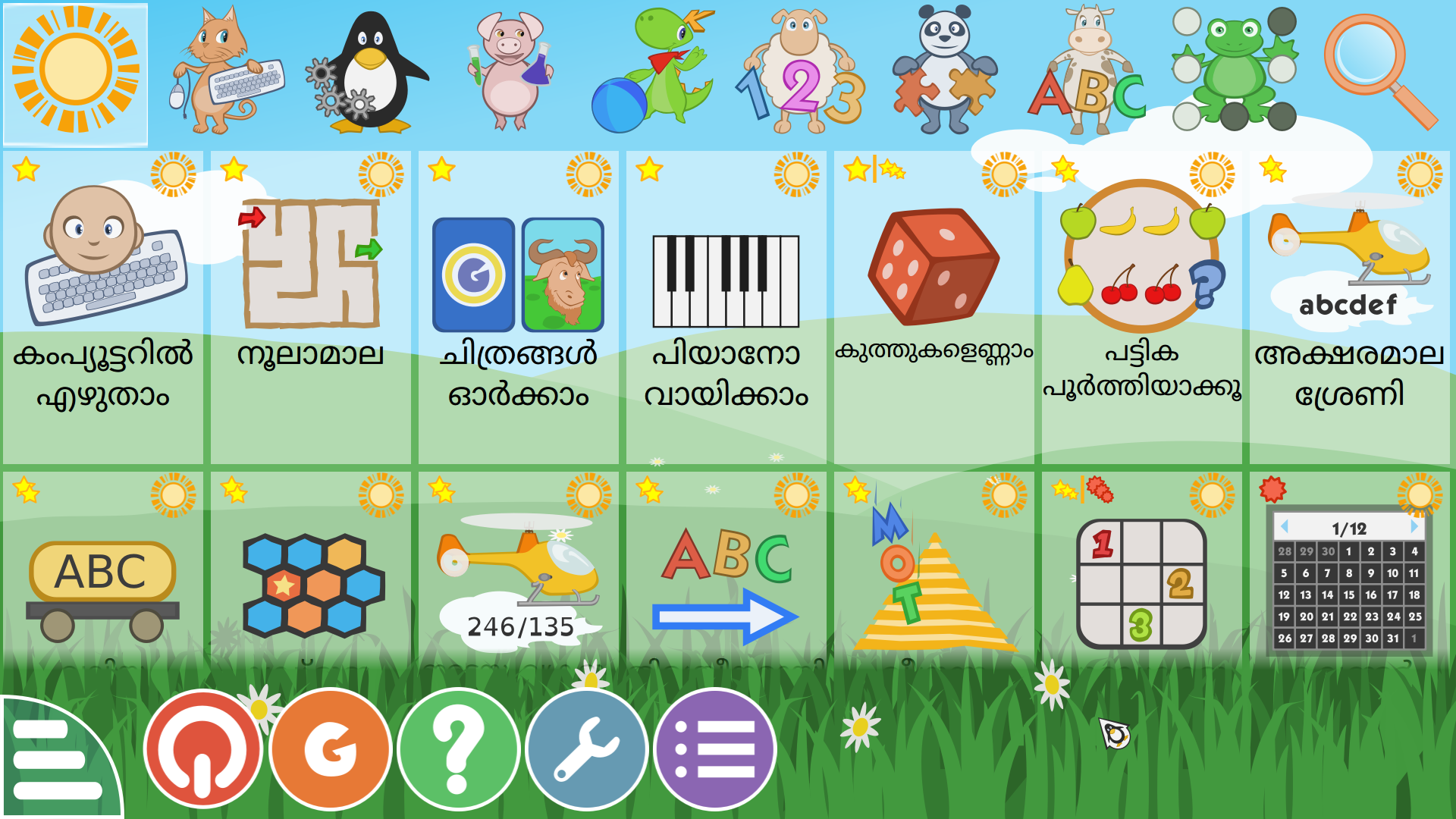 GCompris malayalamiksi
GCompris malayalamiksiSlimbookista tulee KDE:n tukija
Slimbook, espanjalainen Linux-painotteinen tietokonevalmistaja, liittyi KDE:n tukijaksi. Jo vuosia se on tarjonnut GNU/Linux- ja Plasma-tietokoneita ja jatkaa avustuksellaan KDE:n ja vapaiden ohjelmien tukemista.
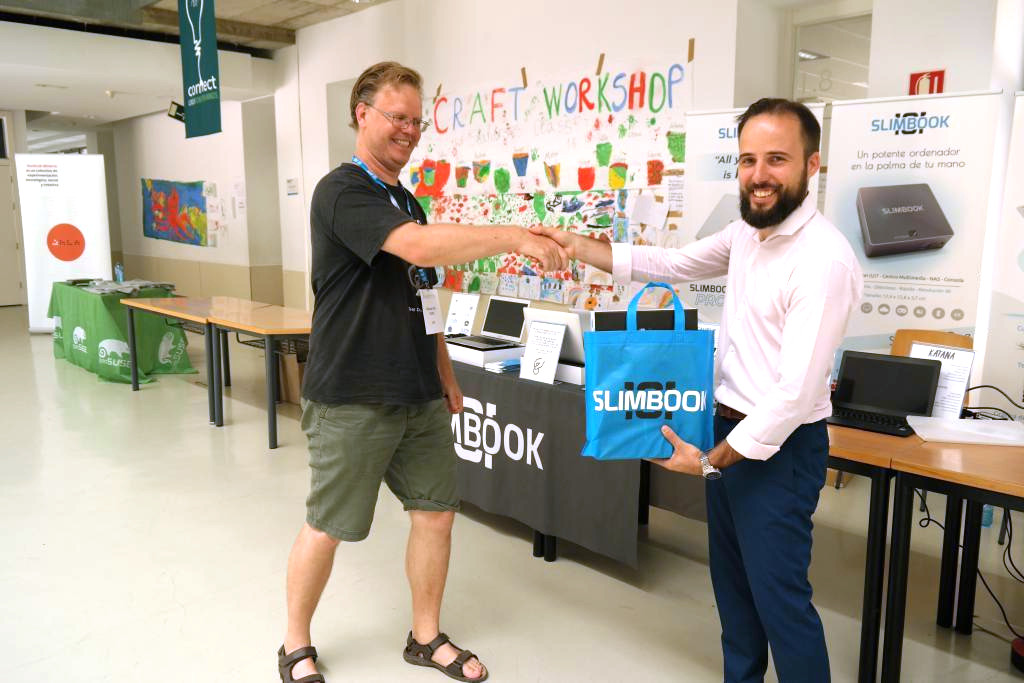 Alejandro López (oikealla), Slimbookin toimitusjohtaja, sekä Adriaan de Groot KDE e.V:n hallituksesta.
Alejandro López (oikealla), Slimbookin toimitusjohtaja, sekä Adriaan de Groot KDE e.V:n hallituksesta.PINE64 liittyy KDE:hen tukijana
PINE64 on yhtiö, joka tähtää tuottamaan edullisia, hyvälaatuisia puhelimiin ja muita laitteita avoimella lähdekoodilla. PINE64:stä tuli KDE:n suojelija sen toimitettua vuosia laitteita KDE-ohjelmilla.
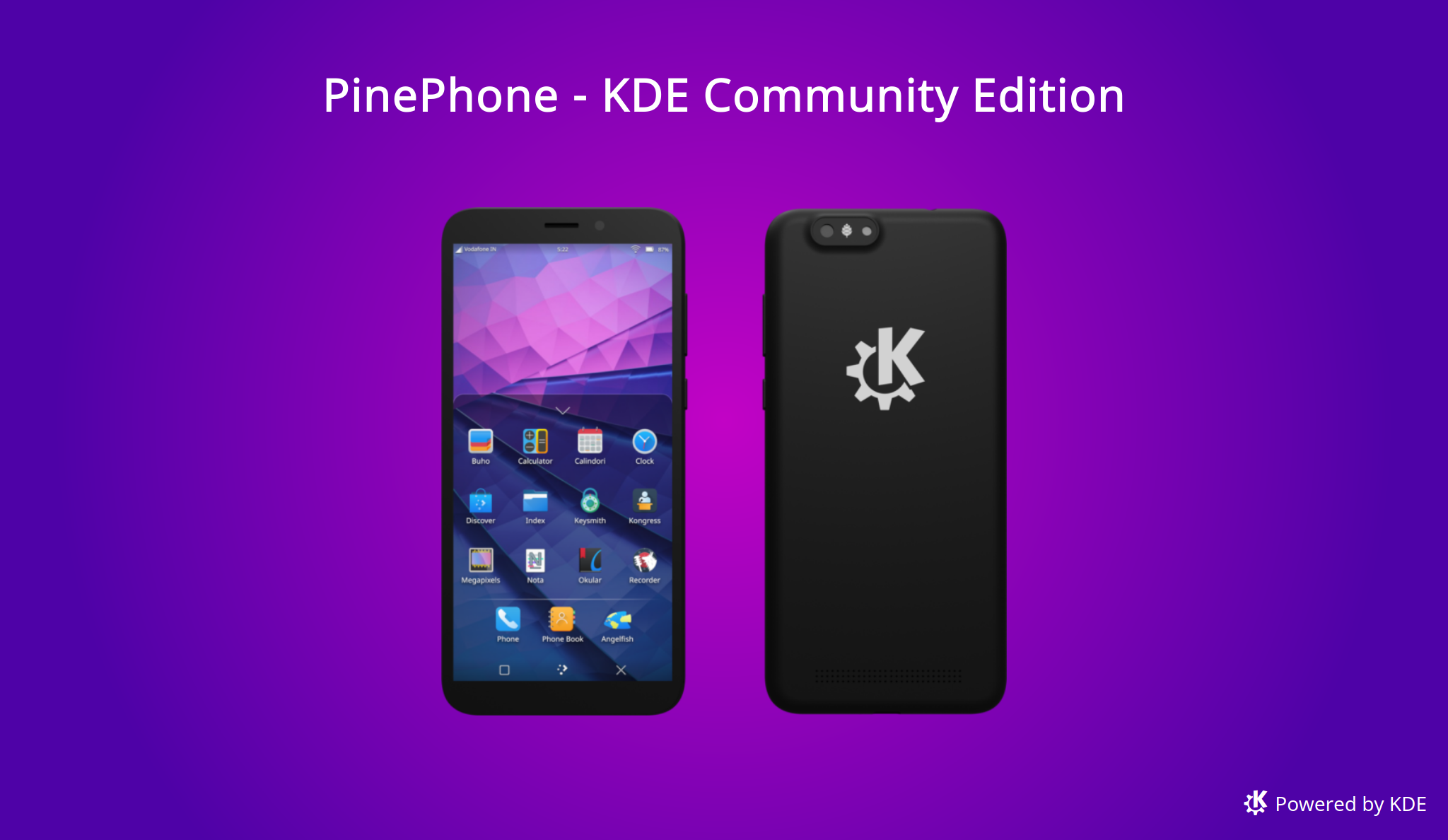 PinePhone – KDE-yhteisöjulkaisu
PinePhone – KDE-yhteisöjulkaisuTUXEDO Computersista tulee KDE:n suojelija
TUXEDO Computers tarjoaa monia tuotteita GNU/Linux ja KDE Plasma esiasennettuina. Jo vuosia se on tukenut vapaita ohjelmia, ja nyt siitä on tullut KDE:n tukija.
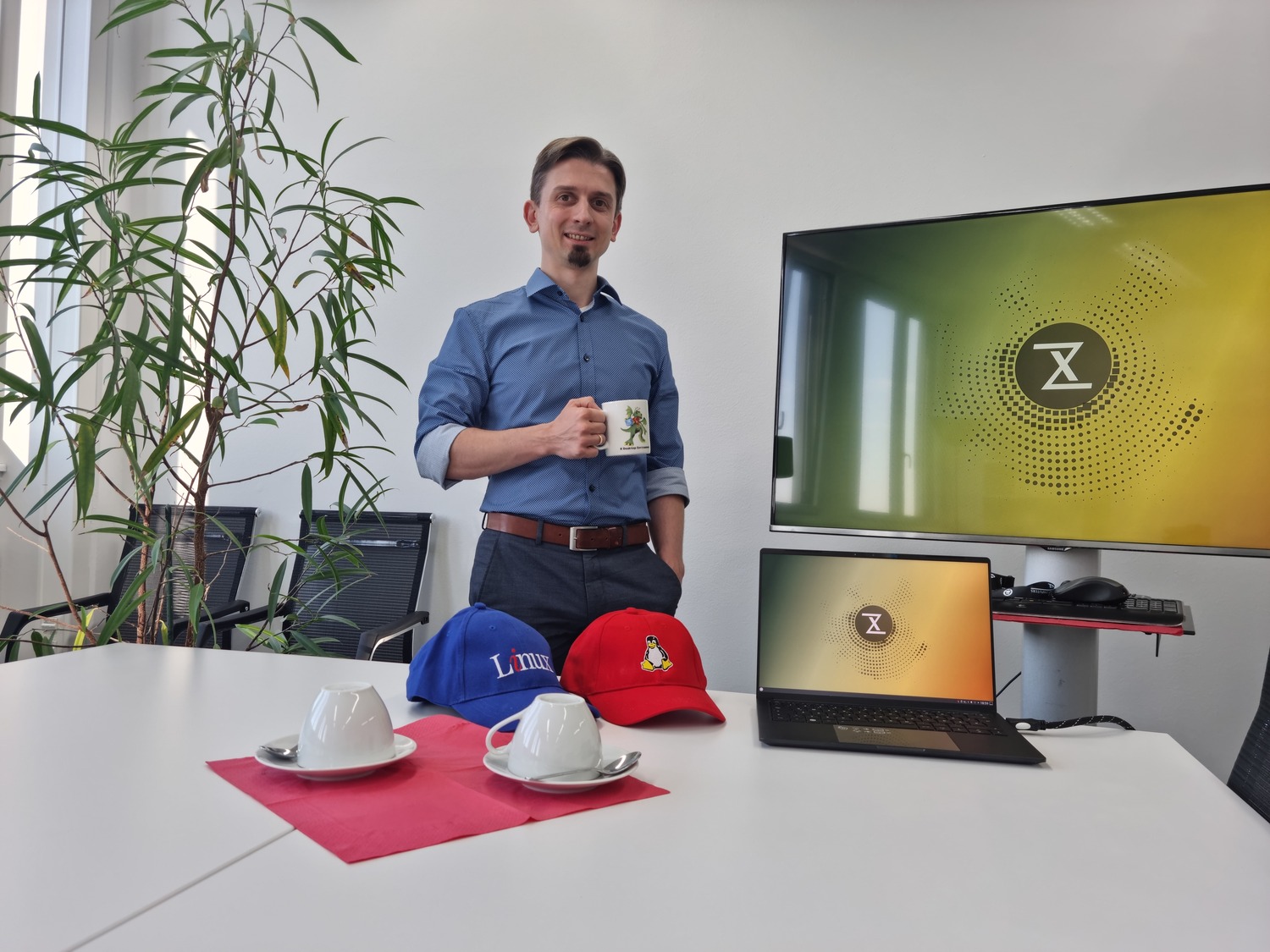 Herbert Feiler, TUXEDO Computersin toimitusjohtaja.
Herbert Feiler, TUXEDO Computersin toimitusjohtaja.Valve valitsee KDE Plasman Steam Deckiin
Valve, Steamin luojat, julkisti KDE Plasman kannettavan Steam Deck -pelitietokoneensa oletustyöpöydäksi. KDE:n kehittäjät ovat yhteistyössä Valven kanssa saaneet Plasman toimimaan Steam Deckissä hyvin.
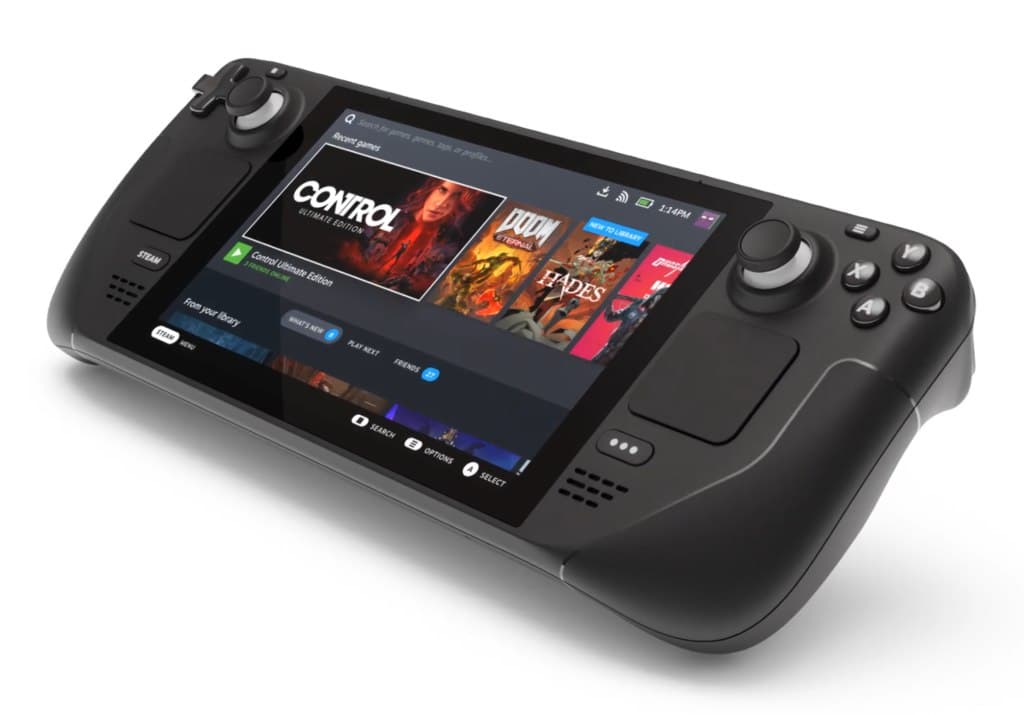 KDE Plasma käytössä Steam Deckissä
KDE Plasma käytössä Steam DeckissäFirst in-person post-Pandemic Akademy held in Barcelona
Akademy 2022 was held in Barcelona from the 1st to the 7th of October. it was the first time in two years Community members and guests laid out in person what had been going on within KDE's projects (and adjacent projects), the state of the art, and where things were headed.
 Attendees to the 2022 Akademy held in Barcelona.
Attendees to the 2022 Akademy held in Barcelona.KDE runs two consecutive fundraisers and completes them both
KDE attempted two new fundraising initiatives in 2022. The first involved raising funds for a specific app: Kdenlive, KDE's video editor. Our goal was to raise €15,000 to enable developers to add much-requested features and stabilize the code. The second initiative was the end-of-year fundraiser, where we aimed to raise €20,000. Both fundraisers were massive successes, surpassing the goals we had set. This achievement stands as a testament to the generosity of community members, supporters, and users.
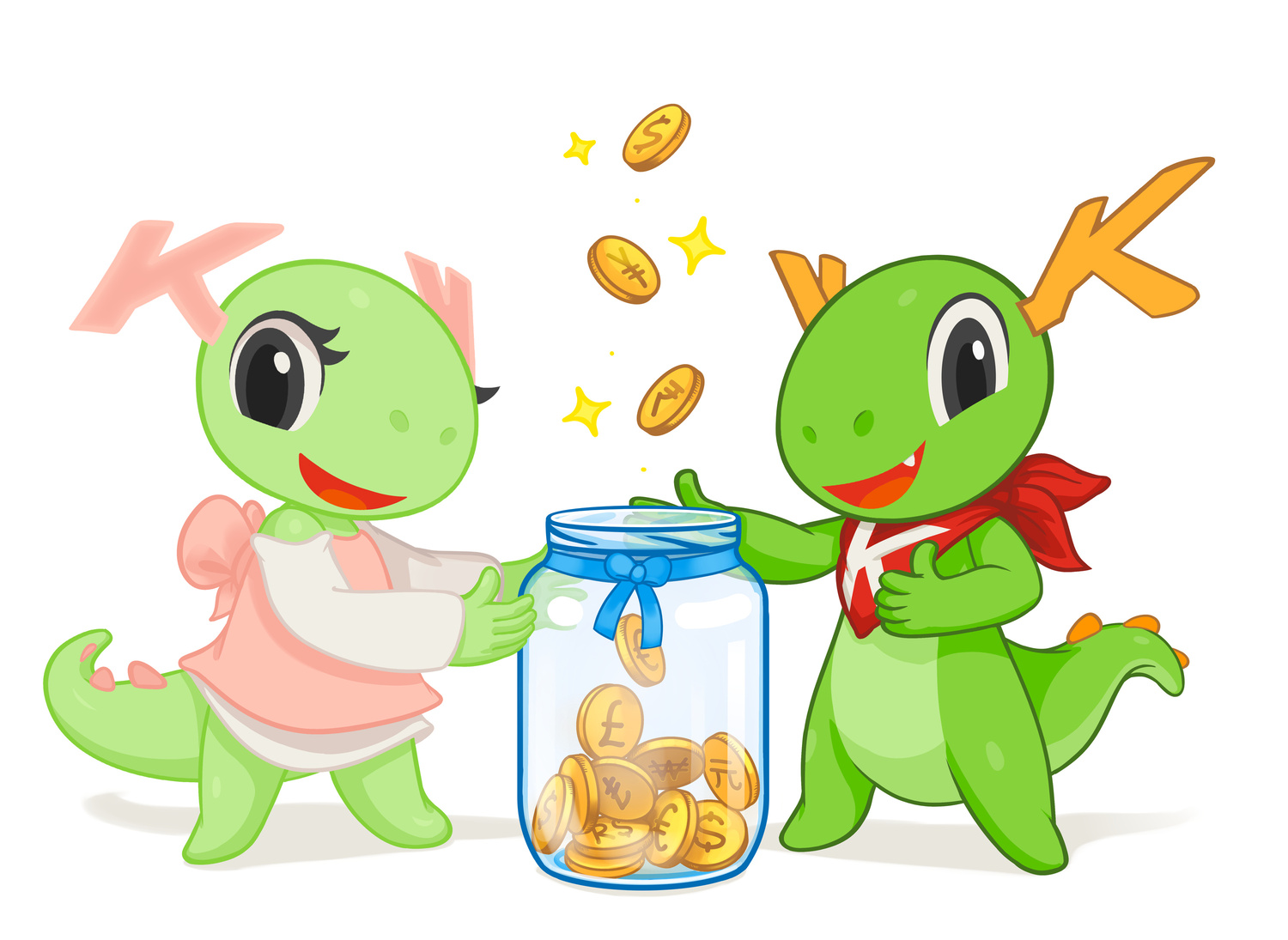 Katie and Konqi thank you for your donation.
Katie and Konqi thank you for your donation.The KDE Free Qt Foundation celebrates its 25th anniversary
The Foundation guarantees the present and future freedom of the Qt framework as it has the right to release Qt under the BSD license if necessary to ensure that Qt remains open source. This remarkable legal guarantee protects the free software community and creates trust among developers, contributors, and customers.
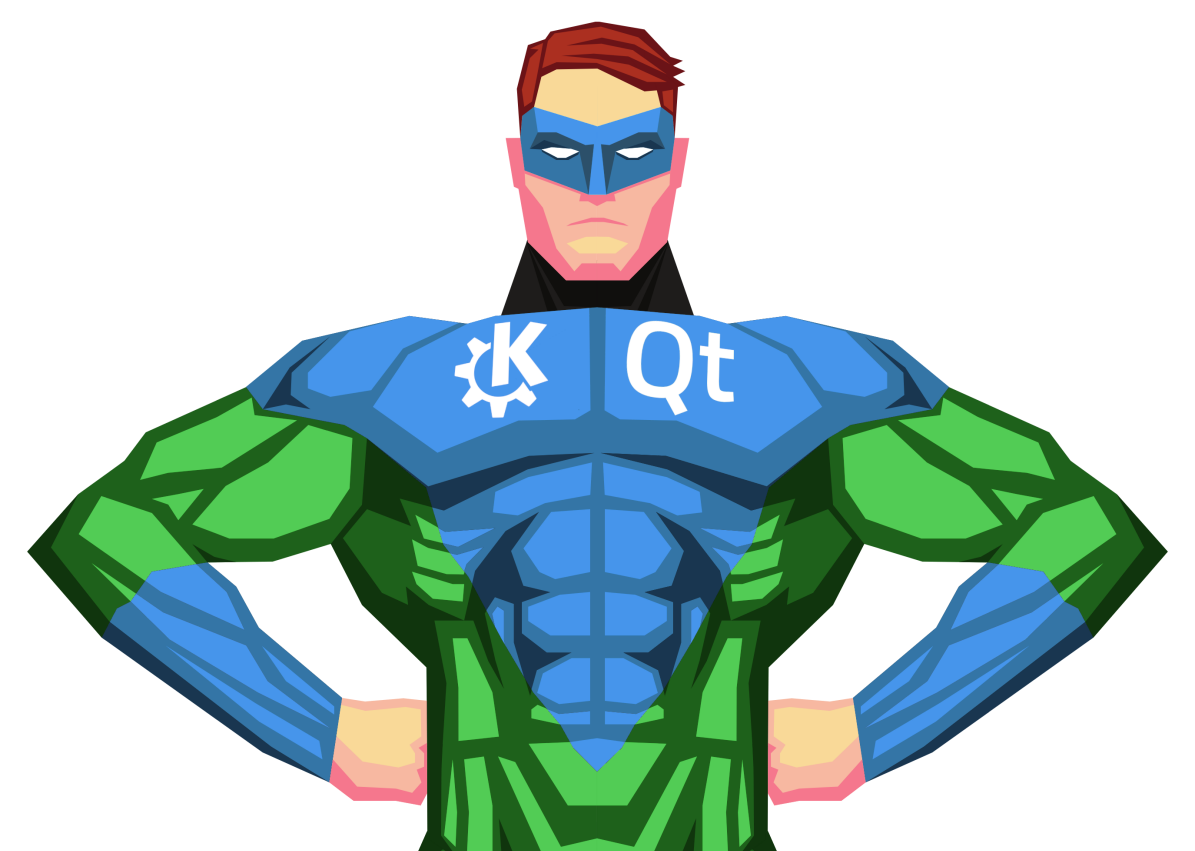 The KDE Free Qt Foundation helps keep the Qt toolset free.
The KDE Free Qt Foundation helps keep the Qt toolset free.g10 Code Becomes a KDE Patron
g10 Code GmbH joined the ranks of KDE patrons. g10 Code provides custom development, enhancements, and audits of cryptographic software -- in particular for the popular GnuPG encryption and digital signature tools.
 The g10 logo.
The g10 logo.KDE Launches Plasma 6
With Plasma 6, our technology stack underwent two major upgrades: a transition to the latest version of our application framework, Qt, and a migration to the modern Linux graphics platform, Wayland. The launch was dubbed "MegaRelease", as new versions of KDE's apps and Frameworks, along with a new version of Plasma Mobile were all published at the same time.
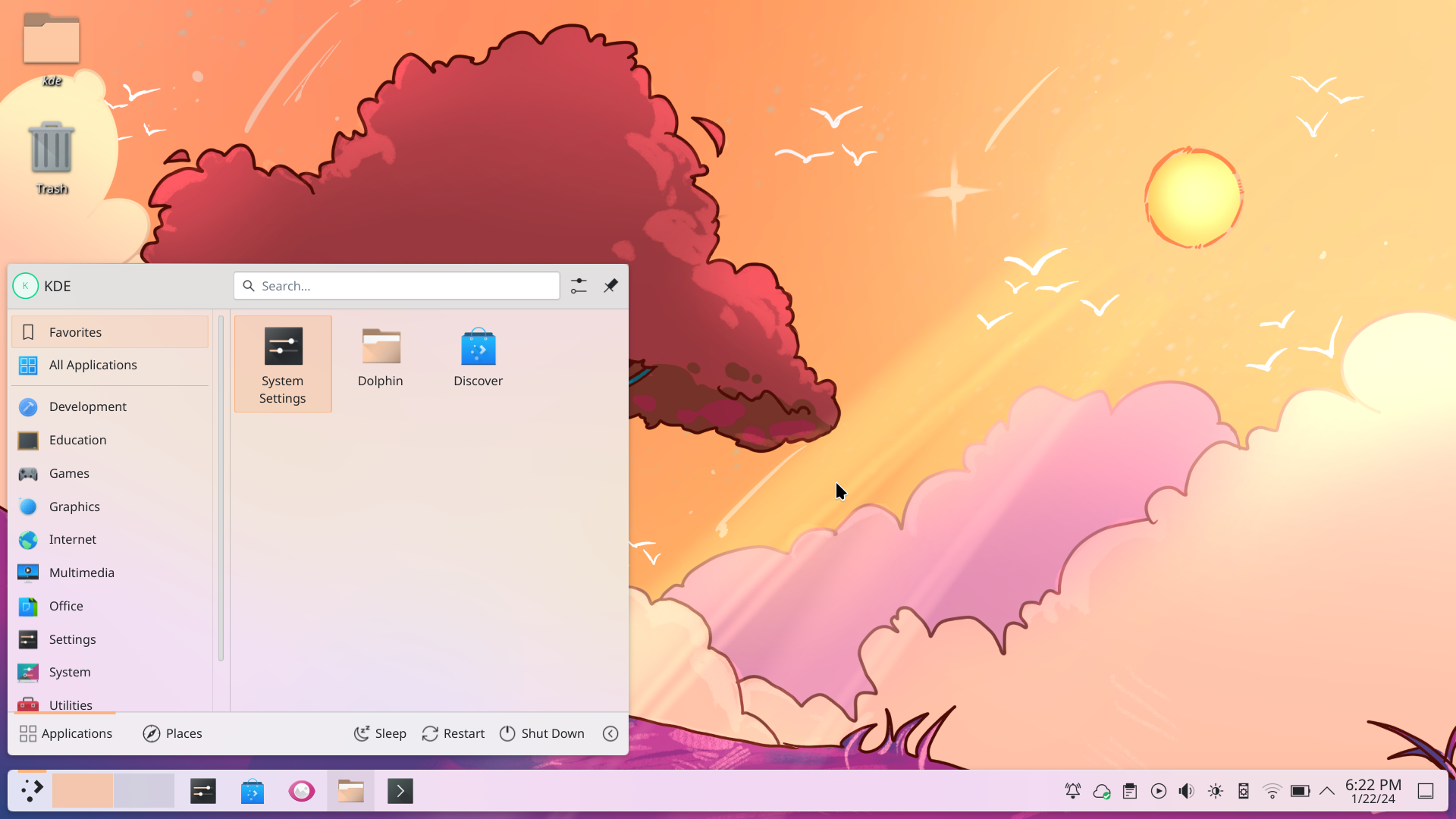 The default Plasma 6 desktop environment.
The default Plasma 6 desktop environment.